#double bow windsor
Explore tagged Tumblr posts
Text

Two White Chairs on Red Floor (cover) * - Pierre Le-Tan , 1974.
French b. 1950 -
Ink and watercolour on paper
*New Yorker
177 notes
·
View notes
Text


CATHERINE'S STYLE FILES - 2023
1 MARCH 2023 || The Princess of Wales along with Prince William visted the 1st Battalion Welsh Guards at Combermere Barracks for the St David’s Day Parade in Windsor.
Catherine was in -
↬ Double-Breasted Slim-Fit Wool Coat by Alexander McQueen
↬ Long Red Skirt
↬ Bow & Arrow Hat in Black from Juliette Botterill
↬ Daisy Heritage Diamond Earrings by Asprey London
↬ Welsh Guards Leek Brooch (possibly Princess Diana's)
↬ Black Gloves from Evica Gloves by Evica Milovanov-Penezic
↬ Amberley Croc-Effect Small Crossbody Bag from Mulberry
↬ Bespoke Black Suede Boots by Gianvito Rossi
#catherines style files#style files 2023#british royal family#british royals#british royalty#royalty#kate middleton#royals#royal#royal fashion#fashion#st davids day parade 23#st davids day 23#alexander mcqueen.#juliette botterill.#catherine in juliette botterill.#asprey london.#daisy diamond earrings.#daisy heritage diamond earrings.#daisy earrings.#princess catherine : daisy diamond earrings.#queen elizabeth ii : welsh guards leek brooch.#welsh guards leek brooch.#evica gloves.#gianvito rossi.#mulberry.#princess of wales#princess catherine#the princess of wales#01.03.2023
48 notes
·
View notes
Text
Doctor Who: Silver Nemesis
I rewatched this serial on 23 May 2023. The first part of it first aired in the UK on 23 November 1988, the show’s 25th anniversary.
We begin in sunny climes, in South America somewhere, on 23 November 1988. Ride of the Valkyries is playing and a stern looking fellow picks up a bow to shoot a parrot but he’s distracted by some good news. Nazi memorabilia is strewn all about and there is a bunch of men dressed in military uniforms who salute the fourth reich. Subtle this is not.
Meanwhile, in England of 1638, a woman shoots a pigeon with an arrow. She plots things while a man looking at the stars says a comet will land where it started its journey on 23 November 1988. Then she and her assistant travel through time to 1988.
And in outer space a rock with an occupant wends its way back to Earth on a 25 year cycle…
Our heroes are relaxing outside listening to Courtney Pine play some jazz until the Doctor’s alarm goes off and they are shot at by some weird white men. The Doctor has made Ace another ghetto blaster that doubles as a detector that reveals the Earth is in danger… and then the Cybermen turn up along with the Nazis from South America on what must have been a turbo-charged jet that wasn’t searched by customs or immigration given the guns they’re carrying…
Once more the Doctor is on a convoluted mission that he knows a lot about because he set it all in motion. Once more, the Doctor is pitted against fascistic enemies. Some of them are even actual Nazis and neo-Nazis, not merely allegorical Nazis. But they are there, too. While the setting of the tale in and around Windsor Castle allowed the joke about Queen Elizabeth, given the ongoing revelations about just how racist that entire institution is, there’s an added layer to this story and season.
I don’t know whether it’s age, but this story hangs together a lot better than I remembered it doing. It’s actually quite fun.
1 note
·
View note
Text
What are the best places to get welding helmet?

Your welding helmet is both your shadow and unquestionably your most valuable welding equipment. Because it is worn while working, the helmet becomes an extension of the worker. It’s crucial that you feel comfortable wearing your helmet because it never comes off when you’re working and this makes it essential.
The process of selecting a helmet may sound laborious. You might be surprised by the extent to which the helmet alone will influence your welding technique, though.
A welding helmet is a type of clothing that is worn when doing bound welding in order to shield the face and eyes from dangerous ultraviolet light, sparks, infrared, and heat. They are typically utilized in conjunction with bow welding procedures such as gas tungsten bow welding, gas essence bow welding, and secure essence bow welding.
WHAT SAFETY BENEFITS DO WELDING HELMETS PROVIDE?
The recommendation to wear helmets stems from the numerous safety advantages that welding helmets offer.
The first and final line of protection against probable causes of eye damage during the welding process is often an eye safety helmet. Actinic radiation is the first threat; it is frequently responsible for disorders like cataracts and retinal burning. Strong actinic ray emission from welding arcs can result in welder’s flash and long-term eye damage.
Overall head protection
A proper helmet protects the entire head because it is not just the eyes that are required for vision. Physical harm will occur during welding operations due to sparks, excessive heat, and flying debris; however, this cannot be prioritised if the right helmet is not worn to protect you. Most of those particles won’t even be noticeable to you.
Practical distinctions
Selecting between ordinary and auto-darkening lenses is a key point of distinction for welding helmets. Typical lenses are worn atop what is known as a “passive lens” helmet that employs UV- and IR-coated glass with a rigid and fast shade. Before the torch is in position, the operator wears the helmet and lens upright; once the torch is ready to use, he nods his head and snaps the helmet and lens into place.
Auto-darkening lenses are now available on helmets that can never be worn higher. The optics look at an illuminated arc and only adjust the shade as necessary. They’ll switch back to a dull lens as soon as there isn’t an arc. For prolonged welding, auto-darkening lens square measure is normally more practical.
WHAT ARE THE BEST PLACES TO PURCHASE WELDING HELMETS?
I suggest Windsor welding helmet to make things simpler for you. India’s top producer of helmets and safety equipment in 1996 is Paras Industries (India). Several goods from Paras Industries (India) are safe and of high quality. They take pleasure in offering accessories and helmets in different sizes to meet the needs of every consumer. They offer excellent quality at reasonable pricing.
Windsor offers the highest-quality welding helmets at the most competitive costs, ranging from Rs. 200 to Rs. 1,000. Windsor Helmets provide a painted welding helmet with a fitted head screen that offers protection, performance, and ease of use while flipping the helmet.
Windsor Spring Loaded Welding Defence with Ratchet Safety Helmet, Work & Comfort, Simple Flip Operation, Protection & Performance. Windsor welding helmet with backside safety helmet, work & comfort, easy flip operation, protection & performance.
Moreover, Windsor sells a welding shield that is simple to use in a variety of jobs and that we can also order online. This welding safety equipment is only to be used in conjunction with a security helmet; multiple uses are not permitted.
The unique wrap-around design, when worn, will protect the wearer’s face.
Welders frequently choose not to wear helmets because they did not come up with a suitable alternative once they acquired them. This is a serious error since it doubles the likelihood that they will sustain tissue layer burns and even visual problems. It is hardly surprising that these injuries account for one-fourth of those suffered by welders. The very safest way to avoid any risk is to wear a welding helmet.
0 notes
Text
The Haunting of Prince Harry
Electrified by outrage—and elevated by a gifted ghostwriter—his blockbuster memoir “Spare” exposes more than Harry’s enemies.
By Rebecca Mead in The New Yorker
January 13, 2023
Balmoral Castle, in the Scottish Highlands, was Queen Elizabeth’s preferred resort among her several castles and palaces, and in the opening pages of “Spare” (Random House), the much anticipated, luridly leaked, and compellingly artful autobiography of Prince Harry, the Duke of Sussex, its environs are intimately described. We get the red-coated footman attending the heavy front door; the mackintoshes hanging on hooks; the cream-and-gold wallpaper; and the statue of Queen Victoria, to which Harry and his older brother, William, always bowed when passing. Beyond lay the castle’s fifty bedrooms—including the one known in the brothers’ childhood as the nursery, unequally divided into two. William occupied the larger half, with a double bed and a splendid view; Harry’s portion was more modest, with a bed frame too high for a child to scale, a mattress that sagged in the middle, and crisp bedding that was “pulled tight as a snare drum, so expertly smoothed that you could easily spot the century’s worth of patched holes and tears.”
It was in this bedroom, early in the morning of August 31, 1997, that Harry, aged twelve, was awakened by his father, Charles, then the Prince of Wales, with the terrible news that had already broken across the world: the princes’ mother, Princess Diana, from whom Charles had been divorced a year earlier and estranged long before that, had died in a car crash in Paris. “He was standing at the edge of the bed, looking down,” Harry writes of the moment in which he learned of the loss that would reshape his personality and determine the course of his life. He goes on to describe his father’s appearance with an unusual simile: “His white dressing gown made him seem like a ghost in a play.”
What ghost would that be, and what play? The big one, of course, bearing the name of that other brooding princely Aitch: Hamlet. Within the first few pages of “Spare,” Shakespeare’s play is alluded to more than once. There’s a jocular reference: “To beard or not to beard” is how Harry foreshadows a contentious family debate over whether he should be clean-shaven on his wedding day. And there’s an instance far graver: an account, in the prologue, of a fraught encounter between Harry, William, and Charles in April, 2021, a few hours after the funeral of the Duke of Edinburgh, the Queen’s husband and the Royal Family’s patriarch, at Windsor. The meeting had been called by Harry in the vain hope that he might get his obdurate parent and sibling, first and second in line to the throne, to see why he and his wife, Meghan, the Duchess of Sussex, had felt it necessary to flee Britain for North America, relinquishing their royal roles, if not their ducal titles. The three men met in Frogmore Gardens, on the Windsor estate, which includes the last resting place of many illustrious ancestors, and as they walked its gravel paths they talked with increasing tension about their apparently irreconcilable differences. They “were now smack in the middle of the Royal Burial Ground,” Harry writes, “more up to our ankles in bodies than Prince Hamlet.”
King Charles, as he became upon the death of Queen Elizabeth, in September, will not find much to like in “Spare,” which may offer the most thoroughgoing scything of treacherous royals and their scheming courtiers since the Prince of Denmark’s bloody swath through the halls of Elsinore. Queen Camilla, formerly “the Other Woman” in Charles and Diana’s unhappy marriage, is, Harry judges, “dangerous,” having “sacrificed me on her personal PR altar.” William’s wife, Kate, now the Princess of Wales, is haughty and cool, brushing off Meghan’s homeopathic remedies. William himself is domineering and insecure, with a wealth of other deficits: “his familiar scowl, which had always been his default in dealings with me; his alarming baldness, more advanced than my own; his famous resemblance to Mummy, which was fading with time.” Charles is, for the most part, more tenderly drawn. In “Spare,” the King is a figure of tragic pathos, whose frequently repeated term of endearment for Harry, “darling boy,” most often precedes an admission that there is nothing to be done—or, at least, nothing he can do—about the burden of their shared lot as members of the nation’s most important, most privileged, most scrutinized, most publicly dysfunctional family. “Please, boys—don’t make my final years a misery,” he pleads, in Harry’s account of the burial-ground showdown.
As painful as Charles must find the book’s revealing content, he might grudgingly approve of Harry’s Shakespearean flourishes in delivering it. Thirty-odd years ago, in giving the annual Shakespeare Birthday Lecture at the Swan Theatre in Stratford-Upon-Avon, the future monarch spoke of the eternal relevance of the playwright’s insights into human nature, citing, among other references, Hamlet’s monologue with the phrase “What a piece of work is a man!” Shakespeare, Charles told his audience, offers us “blunt reminders of the flaws in our own personalities, and of the mess which we so often make of our lives.” In “Spare,” Harry describes his father’s devotion to Shakespeare, paraphrasing Charles’s message about the Bard’s works in terms that seem to refer equally to that other pillar of British identity, the monarchy: “They’re our shared heritage, we should be cherishing them, safeguarding them, and instead we’re letting them die.”
Harry counts himself among “the Shakespeareless hordes,” bored and confused as a teen-ager when his father drags him to see performances of the Royal Shakespeare Company; disinclined to read much of anything, least of all the freighted works of Britain’s national author. (“Not really big on books,” he confesses to Meghan Markle when, on their second date, she tells him she’s having an “Eat, Pray, Love” summer, and he has no idea what she’s on about.) Harry at least gives a compelling excuse for his inability to discover what his father so valued, though it’s probably not one that he gave to his schoolmasters at Eton. “I tried to change,” he recalls. “I opened Hamlet. Hmm: Lonely prince, obsessed with dead parent, watches remaining parent fall in love with dead parent’s usurper . . . ? I slammed it shut. No, thank you.”
That passage indicates another spectral figure haunting the text of “Spare”—that of Harry’s ghostwriter, J. R. Moehringer. Harry, or his publishing house—which paid a reported twenty-million-dollar advance for the book—could not have chosen better. Moehringer is a Pulitzer Prize-winning reporter turned memoirist and novelist, as well as the ghostwriter of, most notably, Andre Agassi’s thrillingly candid memoir, “Open.” In that book, published in 2009, a tennis ace once reviled for his denim shorts and flowing mullet revealed himself to be a troubled, tennis-hating neurotic with father issues and an unreliable hairpiece. When the title and the cover art of “Spare” were made public, late last year, the kinship between the two books—single-word title; closeup, set-jaw portrait—indicated that they were to be understood as fraternal works in the Moehringer œuvre. Moehringer has what is usually called a novelist’s eye for detail, effectively deployed in “Spare.” That patched, starched bed linen at Balmoral, emblazoned with E.R., the formal initials of the Queen, is, of course, a metaphor for the constricting, and quite possibly threadbare, fabric of the institution of monarchy itself.
Moehringer has also bestowed upon Harry the legacy that his father was unable to force on him: a felicitous familiarity with the British literary canon. The language of Shakespeare rings in his sentences. Those wanton journalists who publish falsehoods or half-truths? They treat the royals as insects: “What fun, to pluck their wings,” Harry writes, in an echo of “King Lear,” a play about the fragility of kingly authority. During his military training as a forward air controller, a role in which he guided the flights and firepower of pilots from an earthbound station, Harry describes the release of bombs as “spirits melting into air”—a phrase drawn from “The Tempest,” a play about a duke in exile across the water. Elevating flourishes like these give readers—perhaps British ones in particular—a shiver of recognition, as if the chords of “Jerusalem” were being struck on a church organ. But they also remind those readers of the necessary literary artifice at work in the enterprise of “Spare,” as Moehringer shapes Harry’s memories and obsessions, traumas and bugbears, into a coherent narrative: the peerless ghostwriter giving voice to the Shakespeareless prince.
Moehringer has fashioned the Duke of Sussex’s life story into a tight three-act drama, consisting of his occasionally wayward youth; his decade of military service, which included two tours of duty in Afghanistan; and his relationship with Meghan. Throughout, there are numerous bombshells, which—thanks to the o’er hasty publication of the book’s Spanish edition—did not so much melt into air as materialize into clickbait. These included the allegation that, in 1998, Camilla leaked word to a tabloid of her first meeting with Prince William—according to Harry, the opening sally in a campaign to secure marriage to Charles and a throne by his side. (Harry does not mention that, at the time, Camilla’s personal assistant took responsibility for the leak—she’d told her husband, a media executive, who’d told a friend, who’d told someone at the Sun, who’d printed it. Bloody journalists.) They also include less consequential but more titillating arcana, such as Harry’s account of losing his virginity, in a field behind a pub, to an unnamed older woman, who treated him “not unlike a young stallion. Quick ride, after which she’d smacked my rump and sent me off to graze.” The Daily Mail, Harry’s longtime media nemesis, had a field day with that revelation, door-stepping a now forty-four-year-old businesswoman to come up with the deathless headline “Horse-loving ex-model six years older than Harry, who once breathlessly revealed the Prince left her mouth numb with passionate kissing in a muddy field, refuses to discuss whether she is the keen horsewoman who took his virginity in a field.”
The leaks have done the book’s sales no harm, and neither have Harry’s pre-publication interviews on “Good Morning America” and “60 Minutes”; in the U.K., Harry did an hour-and-a-half-long special with Tom Bradby, the journalist to whom Meghan tearfully bemoaned, in the fall of 2019, that “not many people have asked if I’m O.K.” But “Spare” is worth reading not just for its headline-generating details but also for its narrative force, its voice, and its sometimes surprising wit. Harry describes his trepidation in telling his brother that he intended to propose to Meghan: William “predicted a host of difficulties I could expect if I hooked up with an ‘American actress,’ a phrase he always managed to make sound like ‘convicted felon’ ”—an observation so splendid that a reader can only hope it was actually Harry’s.
There is much in the book that people conversant with the contours of the Prince’s life, insofar as they have hitherto been reported, will find familiar. At the same time, Harry bursts any number of inaccurate reports, including a rumored flirtation with another convicted fel— sorry, American actress, Cameron Diaz: “I was never within fifty meters of Ms. Diaz, further proof that if you like reading pure bollocks then royal biographies are just your thing.” Not a few of the incidents Harry chooses to describe in detail are centered on images or stories already in the public domain, such as being beset by paparazzi when leaving night clubs—he explains that he started being ferried away in the trunk of his driver’s car so as to avoid lashing out at his pursuers—and being required to perform uncomfortable media interviews while serving in Afghanistan in exchange for the newspapers’ keeping shtum about his deployment, for security reasons. (An Australian publication blew the embargo, and Harry was swiftly extracted from the battlefield.)
Given that what Harry dredges up from his past are so often things that have been publicly documented, one wonders whether Moehringer was obliged to indulge Harry’s extended dilation upon media-inflicted wounds, through Zoom sessions that even sympathetic readers will find exhausting to contemplate. There is a certain amount of score-settling and record-straightening, which, though obviously important to the author, can be wearying to a reader, who may feel that if she has to read another word about those accursed bridesmaids’ dresses—of who said what to whom, and who caused whom to cry—she just might burst into tears herself. More significantly, though, there are broadsides against unforgivable intrusions committed by the press, including phone hacking. (Harry is still engaged in lawsuits against a number of British newspapers that allegedly intercepted his voice mails more than a dozen years ago.)
And then there are pages and pages devoted to Harry’s personal trials, which even the most dogged reporter on Fleet Street would not dare dream of uncovering. Chief among these is Harry’s struggle to overcome penile frostnip after a charitable Arctic excursion with a group of veterans, which ends up in a clandestine visit to a Harley Street doctor; he writes, “North Pole, I told him. I went to the North Pole and now my South Pole is on the fritz.” “On the fritz” is an Americanism that we can hope Harry picked up while guiding American pilots—he calls them Yanks—back to base in Afghanistan, rather than the exchange being the ingenious invention of his ghostwriter. Moehringer, on the whole, does a good job of conveying the laddish argot of a millennial British prince, who addresses his friends as “mate” and—repeatedly—calls his penis his “todger.”
Above all, “Spare” is worth reading for its potential historical import, which is likely to resonate, if not to the crack of doom, then well into the reign of King Charles III, and even into that of his successor. As was the case in 1992 with the publication of “Diana: Her True Story,” by Andrew Morton—to whom, it was revealed after her death, the Princess of Wales gave her full coöperation, herself the ghost behind the writer—“Spare” is an unprecedented exposure of the Royal Family from the most deeply embedded of informants. The Prince in exile does not hesitate to detail the pettiness, the vanity, and the inglorious urge toward self-preservation of those who are now the monarchy’s highest-ranking representatives.
It’s not clear that even now, having authored a book, Harry entirely understands what a book is; when challenged by Tom Bradby about his decision to reveal private conversations after having railed so forcefully about the invasive tactics of the press, Harry replied, “The level of planting and leaking from other members of the family means that in my mind they have written countless books—certainly, millions of words have been dedicated to trying to trash my wife and myself to the point of where I had to leave my country.” Pity the poor ghostwriter who has to hear his craft compared to the spewing verbiage of the media churn—by its commissioning subject, no less. (Man, what a piece of work.) Remarkably, Prince Harry has suggested that he sees the book as an invitation to reconciliation, addressed to his father and brother—a way of speaking to them publicly when all his efforts to address them privately have failed to persuade. “Spare” is, you might say, Prince Harry’s “Mousetrap”—a literary device intended to catch the conscience of the King, and the King after him.
If so, the ruse seems about as likely to end well for Harry as Hamlet’s play-within-a-play efforts did for him. Moehringer, at least, knows this, even if Harry may hope that his own royal plot will swerve unexpectedly from implacable tragedy to restitutive melodrama. In a soaring coda, Moehringer has the Prince once again reflecting on the royal dead, describing the family he belongs to as nothing less than a death cult. “We christened and crowned, graduated and married, passed out and passed over our beloveds’ bones. Windsor Castle itself was a tomb, the walls filled with ancestors,” Harry writes. It’s a powerful motif: the Prince—shattered in childhood by his mother’s death, his every step determined by the inescapable legacy of the countless royal dead—as an unwilling Hamlet pushed, rather than leaping, into the grave.
Recalling the meeting with his father and brother in the Frogmore burial ground with which the book began, Harry invokes the most famous soliloquy from the play of Shakespeare’s that he says he once slammed shut: “Why were we here, lurking along the edge of that ‘undiscover’d country, from whose bourn no traveller returns?’ ” Then comes a final, lovely, true, and utterly poetry-puncturing observation: “Though maybe that’s a more apt description of America.” In moving to the paradisaical climes of California, Harry has been spared a life he had no use for, which had no real use for him. The unlettered Prince has gained in life what Hamlet achieved only in death: his own story shaped on his own terms, thanks to the intervention of a skillful Horatio. You might almost call it Harry’s crowning achievement. ♦
Published in the print edition of the
January 23, 2023, issue, with the headline “The Royal Me.”
Rebecca Mead
is a staff writer at The New Yorker. Her most recent book is “Home/Land.”
0 notes
Text
Books: The Haunting of Prince Harry! Electrified By Outrage—and Elevated By a Gifted Ghostwriter—His Blockbuster Memoir “Spare” Exposes More Than Harry’s Enemies.
— January 23, 2023 Issue | By Rebecca Mead | January 13, 2023 | The New Yorker

The Prince has suggested that he sees his book as an appeal for reconciliation, addressed to his father and brother. Photograph from Max Mumby/Indigo/Getty Images
Balmoral Castle, in the Scottish Highlands, was Queen Elizabeth’s preferred resort among her several castles and palaces, and in the opening pages of “Spare” (Random House), the much anticipated, luridly leaked, and compellingly artful autobiography of Prince Harry, the Duke of Sussex, its environs are intimately described. We get the red-coated footman attending the heavy front door; the mackintoshes hanging on hooks; the cream-and-gold wallpaper; and the statue of Queen Victoria, to which Harry and his older brother, William, always bowed when passing. Beyond lay the castle’s fifty bedrooms—including the one known in the brothers’ childhood as the nursery, unequally divided into two. William occupied the larger half, with a double bed and a splendid view; Harry’s portion was more modest, with a bed frame too high for a child to scale, a mattress that sagged in the middle, and crisp bedding that was “pulled tight as a snare drum, so expertly smoothed that you could easily spot the century’s worth of patched holes and tears.”
It was in this bedroom, early in the morning of August 31, 1997, that Harry, aged twelve, was awakened by his father, Charles, then the Prince of Wales, with the terrible news that had already broken across the world: the princes’ mother, Princess Diana, from whom Charles had been divorced a year earlier and estranged long before that, had died in a car crash in Paris. “He was standing at the edge of the bed, looking down,” Harry writes of the moment in which he learned of the loss that would reshape his personality and determine the course of his life. He goes on to describe his father’s appearance with an unusual simile: “His white dressing gown made him seem like a ghost in a play.”
What ghost would that be, and what play? The big one, of course, bearing the name of that other brooding princely Aitch: Hamlet. Within the first few pages of “Spare,” Shakespeare’s play is alluded to more than once. There’s a jocular reference: “To beard or not to beard” is how Harry foreshadows a contentious family debate over whether he should be clean-shaven on his wedding day. And there’s an instance far graver: an account, in the prologue, of a fraught encounter between Harry, William, and Charles in April, 2021, a few hours after the funeral of the Duke of Edinburgh, the Queen’s husband and the Royal Family’s patriarch, at Windsor. The meeting had been called by Harry in the vain hope that he might get his obdurate parent and sibling, first and second in line to the throne, to see why he and his wife, Meghan, the Duchess of Sussex, had felt it necessary to flee Britain for North America, relinquishing their royal roles, if not their ducal titles. The three men met in Frogmore Gardens, on the Windsor estate, which includes the last resting place of many illustrious ancestors, and as they walked its gravel paths they talked with increasing tension about their apparently irreconcilable differences. They “were now smack in the middle of the Royal Burial Ground,” Harry writes, “more up to our ankles in bodies than Prince Hamlet.”
King Charles, as he became upon the death of Queen Elizabeth, in September, will not find much to like in “Spare,” which may offer the most thoroughgoing scything of treacherous royals and their scheming courtiers since the Prince of Denmark’s bloody swath through the halls of Elsinore. Queen Camilla, formerly “the Other Woman” in Charles and Diana’s unhappy marriage, is, Harry judges, “dangerous,” having “sacrificed me on her personal PR altar.” William’s wife, Kate, now the Princess of Wales, is haughty and cool, brushing off Meghan’s homeopathic remedies. William himself is domineering and insecure, with a wealth of other deficits: “his familiar scowl, which had always been his default in dealings with me; his alarming baldness, more advanced than my own; his famous resemblance to Mummy, which was fading with time.” Charles is, for the most part, more tenderly drawn. In “Spare,” the King is a figure of tragic pathos, whose frequently repeated term of endearment for Harry, “darling boy,” most often precedes an admission that there is nothing to be done—or, at least, nothing he can do—about the burden of their shared lot as members of the nation’s most important, most privileged, most scrutinized, most publicly dysfunctional family. “Please, boys—don’t make my final years a misery,” he pleads, in Harry’s account of the burial-ground showdown.
As painful as Charles must find the book’s revealing content, he might grudgingly approve of Harry’s Shakespearean flourishes in delivering it. Thirty-odd years ago, in giving the annual Shakespeare Birthday Lecture at the Swan Theatre in Stratford-Upon-Avon, the future monarch spoke of the eternal relevance of the playwright’s insights into human nature, citing, among other references, Hamlet’s monologue with the phrase “What a piece of work is a man!” Shakespeare, Charles told his audience, offers us “blunt reminders of the flaws in our own personalities, and of the mess which we so often make of our lives.” In “Spare,” Harry describes his father’s devotion to Shakespeare, paraphrasing Charles’s message about the Bard’s works in terms that seem to refer equally to that other pillar of British identity, the monarchy: “They’re our shared heritage, we should be cherishing them, safeguarding them, and instead we’re letting them die.”
Harry counts himself among “the Shakespeareless hordes,” bored and confused as a teen-ager when his father drags him to see performances of the Royal Shakespeare Company; disinclined to read much of anything, least of all the freighted works of Britain’s national author. (“Not really big on books,” he confesses to Meghan Markle when, on their second date, she tells him she’s having an “Eat, Pray, Love” summer, and he has no idea what she’s on about.) Harry at least gives a compelling excuse for his inability to discover what his father so valued, though it’s probably not one that he gave to his schoolmasters at Eton. “I tried to change,” he recalls. “I opened Hamlet. Hmm: Lonely prince, obsessed with dead parent, watches remaining parent fall in love with dead parent’s usurper . . . ? I slammed it shut. No, thank you.”
That passage indicates another spectral figure haunting the text of “Spare”—that of Harry’s ghostwriter, J. R. Moehringer. Harry, or his publishing house—which paid a reported twenty-million-dollar advance for the book—could not have chosen better. Moehringer is a Pulitzer Prize-winning reporter turned memoirist and novelist, as well as the ghostwriter of, most notably, Andre Agassi’s thrillingly candid memoir, “Open.” In that book, published in 2009, a tennis ace once reviled for his denim shorts and flowing mullet revealed himself to be a troubled, tennis-hating neurotic with father issues and an unreliable hairpiece. When the title and the cover art of “Spare” were made public, late last year, the kinship between the two books—single-word title; closeup, set-jaw portrait—indicated that they were to be understood as fraternal works in the Moehringer œuvre. Moehringer has what is usually called a novelist’s eye for detail, effectively deployed in “Spare.” That patched, starched bed linen at Balmoral, emblazoned with E.R., the formal initials of the Queen, is, of course, a metaphor for the constricting, and quite possibly threadbare, fabric of the institution of monarchy itself.
Moehringer has also bestowed upon Harry the legacy that his father was unable to force on him: a felicitous familiarity with the British literary canon. The language of Shakespeare rings in his sentences. Those wanton journalists who publish falsehoods or half-truths? They treat the royals as insects: “What fun, to pluck their wings,” Harry writes, in an echo of “King Lear,” a play about the fragility of kingly authority. During his military training as a forward air controller, a role in which he guided the flights and firepower of pilots from an earthbound station, Harry describes the release of bombs as “spirits melting into air”—a phrase drawn from “The Tempest,” a play about a duke in exile across the water. Elevating flourishes like these give readers—perhaps British ones in particular—a shiver of recognition, as if the chords of “Jerusalem” were being struck on a church organ. But they also remind those readers of the necessary literary artifice at work in the enterprise of “Spare,” as Moehringer shapes Harry’s memories and obsessions, traumas and bugbears, into a coherent narrative: the peerless ghostwriter giving voice to the Shakespeareless prince.
Moehringer has fashioned the Duke of Sussex’s life story into a tight three-act drama, consisting of his occasionally wayward youth; his decade of military service, which included two tours of duty in Afghanistan; and his relationship with Meghan. Throughout, there are numerous bombshells, which—thanks to the o’er hasty publication of the book’s Spanish edition—did not so much melt into air as materialize into clickbait. These included the allegation that, in 1998, Camilla leaked word to a tabloid of her first meeting with Prince William—according to Harry, the opening sally in a campaign to secure marriage to Charles and a throne by his side. (Harry does not mention that, at the time, Camilla’s personal assistant took responsibility for the leak—she’d told her husband, a media executive, who’d told a friend, who’d told someone at the Sun, who’d printed it. Bloody journalists.) They also include less consequential but more titillating arcana, such as Harry’s account of losing his virginity, in a field behind a pub, to an unnamed older woman, who treated him “not unlike a young stallion. Quick ride, after which she’d smacked my rump and sent me off to graze.” The Daily Mail, Harry’s longtime media nemesis, had a field day with that revelation, door-stepping a now forty-four-year-old businesswoman to come up with the deathless headline “Horse-loving ex-model six years older than Harry, who once breathlessly revealed the Prince left her mouth numb with passionate kissing in a muddy field, refuses to discuss whether she is the keen horsewoman who took his virginity in a field.”

The leaks have done the book’s sales no harm, and neither have Harry’s pre-publication interviews on “Good Morning America” and “60 Minutes”; in the U.K., Harry did an hour-and-a-half-long special with Tom Bradby, the journalist to whom Meghan tearfully bemoaned, in the fall of 2019, that “not many people have asked if I’m O.K.” But “Spare” is worth reading not just for its headline-generating details but also for its narrative force, its voice, and its sometimes surprising wit. Harry describes his trepidation in telling his brother that he intended to propose to Meghan: William “predicted a host of difficulties I could expect if I hooked up with an ‘American actress,’ a phrase he always managed to make sound like ‘convicted felon’ ”—an observation so splendid that a reader can only hope it was actually Harry’s.
There is much in the book that people conversant with the contours of the Prince’s life, insofar as they have hitherto been reported, will find familiar. At the same time, Harry bursts any number of inaccurate reports, including a rumored flirtation with another convicted fel— sorry, American actress, Cameron Diaz: “I was never within fifty meters of Ms. Diaz, further proof that if you like reading pure bollocks then royal biographies are just your thing.” Not a few of the incidents Harry chooses to describe in detail are centered on images or stories already in the public domain, such as being beset by paparazzi when leaving night clubs—he explains that he started being ferried away in the trunk of his driver’s car so as to avoid lashing out at his pursuers—and being required to perform uncomfortable media interviews while serving in Afghanistan in exchange for the newspapers’ keeping shtum about his deployment, for security reasons. (An Australian publication blew the embargo, and Harry was swiftly extracted from the battlefield.)
Given that what Harry dredges up from his past are so often things that have been publicly documented, one wonders whether Moehringer was obliged to indulge Harry’s extended dilation upon media-inflicted wounds, through Zoom sessions that even sympathetic readers will find exhausting to contemplate. There is a certain amount of score-settling and record-straightening, which, though obviously important to the author, can be wearying to a reader, who may feel that if she has to read another word about those accursed bridesmaids’ dresses—of who said what to whom, and who caused whom to cry—she just might burst into tears herself. More significantly, though, there are broadsides against unforgivable intrusions committed by the press, including phone hacking. (Harry is still engaged in lawsuits against a number of British newspapers that allegedly intercepted his voice mails more than a dozen years ago.)
And then there are pages and pages devoted to Harry’s personal trials, which even the most dogged reporter on Fleet Street would not dare dream of uncovering. Chief among these is Harry’s struggle to overcome penile frostnip after a charitable Arctic excursion with a group of veterans, which ends up in a clandestine visit to a Harley Street doctor; he writes, “North Pole, I told him. I went to the North Pole and now my South Pole is on the fritz.” “On the fritz” is an Americanism that we can hope Harry picked up while guiding American pilots—he calls them Yanks—back to base in Afghanistan, rather than the exchange being the ingenious invention of his ghostwriter. Moehringer, on the whole, does a good job of conveying the laddish argot of a millennial British prince, who addresses his friends as “mate” and—repeatedly—calls his penis his “todger.”
Above all, “Spare” is worth reading for its potential historical import, which is likely to resonate, if not to the crack of doom, then well into the reign of King Charles III, and even into that of his successor. As was the case in 1992 with the publication of “Diana: Her True Story,” by Andrew Morton—to whom, it was revealed after her death, the Princess of Wales gave her full coöperation, herself the ghost behind the writer—“Spare” is an unprecedented exposure of the Royal Family from the most deeply embedded of informants. The Prince in exile does not hesitate to detail the pettiness, the vanity, and the inglorious urge toward self-preservation of those who are now the monarchy’s highest-ranking representatives.
It’s not clear that even now, having authored a book, Harry entirely understands what a book is; when challenged by Tom Bradby about his decision to reveal private conversations after having railed so forcefully about the invasive tactics of the press, Harry replied, “The level of planting and leaking from other members of the family means that in my mind they have written countless books—certainly, millions of words have been dedicated to trying to trash my wife and myself to the point of where I had to leave my country.” Pity the poor ghostwriter who has to hear his craft compared to the spewing verbiage of the media churn—by its commissioning subject, no less. (Man, what a piece of work.) Remarkably, Prince Harry has suggested that he sees the book as an invitation to reconciliation, addressed to his father and brother—a way of speaking to them publicly when all his efforts to address them privately have failed to persuade. “Spare” is, you might say, Prince Harry’s “Mousetrap”—a literary device intended to catch the conscience of the King, and the King after him.
If so, the ruse seems about as likely to end well for Harry as Hamlet’s play-within-a-play efforts did for him. Moehringer, at least, knows this, even if Harry may hope that his own royal plot will swerve unexpectedly from implacable tragedy to restitutive melodrama. In a soaring coda, Moehringer has the Prince once again reflecting on the royal dead, describing the family he belongs to as nothing less than a death cult. “We christened and crowned, graduated and married, passed out and passed over our beloveds’ bones. Windsor Castle itself was a tomb, the walls filled with ancestors,” Harry writes. It’s a powerful motif: the Prince—shattered in childhood by his mother’s death, his every step determined by the inescapable legacy of the countless royal dead—as an unwilling Hamlet pushed, rather than leaping, into the grave.
Recalling the meeting with his father and brother in the Frogmore burial ground with which the book began, Harry invokes the most famous soliloquy from the play of Shakespeare’s that he says he once slammed shut: “Why were we here, lurking along the edge of that ‘undiscover’d country, from whose bourn no traveller returns?’ ” Then comes a final, lovely, true, and utterly poetry-puncturing observation: “Though maybe that’s a more apt description of America.” In moving to the paradisaical climes of California, Harry has been spared a life he had no use for, which had no real use for him. The unlettered Prince has gained in life what Hamlet achieved only in death: his own story shaped on his own terms, thanks to the intervention of a skillful Horatio. You might almost call it Harry’s crowning achievement. ♦
— Published in the print edition of the January 23, 2023, Issue, with the headline “The Royal Me.”
0 notes
Photo

Double Bar Brooch ♕ Queen Elizabeth II
#queen elizabeth#queen elizabeth ii#elizabeth bowes lyon#queen elizabeth the queen mother#the queen mother#queen mother#queen mary#queen alexandra#Queen Victoria#double bar brooch#bar brooch#diamond bar brooch#diamond brooch#Diamond Jewelry#diamond jewels#british royal family#british royal jewels#royal jewels#Windsor#House of Windsor#windsors#queen elizabeth brooches#queen elizabeth brooch#personal property#personal jewelry#queen elizabeth personal jewelry#queen elizabeth personal property#Windsor Royal Jewels#Duchess of Edinburgh#King Charles
35 notes
·
View notes
Text
Fate & Secrets Ch. 5
✺ Hyperion ✺
Alaya would skip meetings with her father’s advisors all together if she had her way. Better yet, she’d abolish the meetings and make decisions for herself. After all, she was a queen. Shouldn’t she be given privileges befitting her title?
“My lady,” The urgent voice of Alfie Harridan, Alaya’s advisor for courtly relationships, snapped her out of her thoughts. “Your father’s death has affected us all, believe me, but we need to think ahead. You are young. You need a king by your side, someone to rule with you.”
Alaya eyed the man who was only a bit older than her father had been. He was a tall but stout man with russet brown eyes and graying blonde hair. Alfie had been her father’s advisor ever since Alaya could remember, but two months ago he’d been just that: her father’s advisor. A stranger to her. They were all strangers, strangers telling her she was not fit to rule without a man by her side. She wanted to throw something. Did they truly think she was that incapable?
But you said it yourself, Alaya, Her brain taunted. You’re not ready to rule.
“Are you certain we can afford a royal wedding, Alfie?” worried Shamus Whittaker, who oversaw the finances both inside and outside the castle walls. He ran a hand through his bright red hair.
When they first met, Alaya wondered if he was related to Prince Leander Blakely of Gervasio, the half-brother to King Gerard, whose hair was the same shade of red. It turned out Shamus was a distant cousin whose family had moved to Hyperion before he was born. Part of her wondered if there was some sort of scandal involved in the move, but there were more pressing matters at hand.
“I never agreed to any wedding!” Alaya protested, rising from her seat, but Matthias materialized by her side to gently push her down. Sophia, who was seated next to Alaya, placed a soft hand over hers.
“This is just talk, my lady,” Sophia assured her, squeezing Alaya’s fingers. “Nothing is set in stone. But we can only keep this up for so long.” Not only was Sophia Alaya’s lady-in-waiting and closest friend, she was also the kingdom’s master spy, the one who gathered information for the crown. Alaya often teased Sophia about her Sagaxan tendencies, since the girl was often forced to do most of her snooping at night.
“I need time,” Alaya pulled her hand free so she could rub her temples. “I’m sure we can come up with something. Perhaps we could say he contracted an illness from–”
“From what, my lady?” Fergus Curnow, the advisor who oversaw foreign affairs, snorted. “Sun poisoning? Sagaxan bandits?”
“I’d strongly advise leaving Sagax out of this,” interjected Orson Windsor, the battle and strategy advisor, also Matthias’s boss. “Seeing as King Ludovic makes no attempt to hide his eagerness to shed Hyperionese blood.”
Alaya scowled at him. “I’m not an idiot, Lord Windsor,” she snapped. “Provoking the Sagaxans will get us nowhere.”
“I’m glad you think so, Your Majesty,” A new but irritatingly familiar voice sounded, causing every head in the room to turn. Immediately Matthias’s sword was drawn. Her advisors stood to form a ring around their monarch, while Sophia grabbed Alaya’s arm and shoved her behind her, which was pointless, seeing as her friend was shorter than Alaya by a lot, but she didn’t have time to protest.
“Prince Adonis,” Fergus cleared his throat, offering a curt bow. “My queen tells me you’ve been a frequent visitor as of late.”
“Well,” Adonis arched his brow. “She’s not your queen yet, is she, Lord Curnow?”
“Yet you refer to her with a queen’s title?” Matthias pointed his sword at Adonis. “Your double-standards are disgusting.”
Adonis shrugged, his eyes zeroing in on Alaya.
“You’re awfully quiet, Alaya.��
“Do not call me Alaya,” She hissed, taking a step forward, but Sophia was unmovable, forcing Alaya to step back reluctantly. “You haven’t earned the right.”
“Perhaps not,” The prince smirked. “But it got you to talk, didn’t it? I was beginning to grow concerned when you were so quiet. Usually you have so much to say.”
“Only when people like you are involved,” Alaya countered, clenching her hands into fists. “What are you doing here?”
Adonis looked confused. “I thought you’d be expecting me, Your Majesty,” he replied, glancing around the room with surprise. “A fortnight has almost passed. You didn’t think I was going to back out, did you?” When Alaya didn’t respond, the prince laughed. “You really assumed I’d forget your threat to my people, to Sagax as a whole? You’re a bigger fool than I gave you credit for, sol regina.”
Sun queen. An insult, no doubt, but before Alaya had a chance to fight back, Fergus spoke once more.
“What does he speak of, Your Majesty?” he asked in a low, dangerous tone. Alaya gulped and stammered out the details of her and Adonis’s last interaction.
“So,” Adonis finished her story with a flourish. “I’ve come to deliver the contract. The people of Sagax can be amenable under such circumstances.”
“Not interested,” Alaya immediately snapped, but everyone shushed her, including Sophia.
“Go on, Your Highness.” Fergus said, ever the diplomat. Adonis straightened, his chin tilting up, as if he was pleased to be the center of attention.
He crossed the room to sit in the chair to Alaya’s left, making himself at home. Alaya, Sophia, and her advisors had no choice but to follow suit. Alaya reluctantly sat next to Adonis. Sophia sat on Alaya’s other side, while her other advisors scattered around the long mahogany table. Matthias sheathed his sword but remained close, his watchful eyes trained on Adonis.
“Ask and you shall receive, Lord Curnow,” Adonis slid the contract over to Fergus, smirking when Alaya made a grab for the papers, knowing her advisor wouldn’t let her see them even before he snatched them out of her grasp. He leaned back in his chair once more, fishing in his pockets for the grapes he brought to snack on. As soon as Adonis popped one into his mouth, he felt Alaya’s eyes on him.
“Are you actually eating right now?” She asked with surprised anger in her voice.
“Am I forbidden to eat in your presence, Your Majesty?” Adonis tossed another grape into his mouth, glancing around at her advisors. “Is this a rule among your court? If so, I'll gladly wait to eat my grapes on the journey home.”
Everyone stared at him with varying degrees of shock.
“No, Your Highness,” Sophia was the first to recover. “You may eat your grapes.”
Adonis gave her his most winning smile. “I appreciate it, Susanna–”
“Sophia,” Sophia corrected him, making Alaya snort.
“The journey here is so long,” Adonis continued as if no one had spoken a word. “I was practically beginning to starve!”
“Pity you didn’t,” Alaya mumbled under her breath, earning her yet another glare from her advisors, though this time she heard Matthias choke back a laugh.
Fergus cleared his throat. “If I may…”
He began to read the terms of the contract aloud. Adonis barely paid attention to the contents; he’d been there when the Sagaxan foreign affairs advisor, Darius Stolo, wrote up the contract.
Adonis was jolted out of his thoughts when Alaya suddenly leaned forward, eyes bright with delight. “Malik will be here for the festival as well? That’s wonderful!”
“What?” He scoffed, meeting Fergus’s eyes. “Surely you’re mistaken, Lord Curnow.”
“No, Your Highness.” Fergus tried his best to remain calm; he was already developing a piercing headache. “The contract states here that your brother is also to attend–”
Adonis snatched the contract out of Fergus’s hands without further preamble, scanning the document, sure the Hyperionese man had lost his mind.
His jaw dropped, because there it was.
“‘His Majesty the King requires the presence of his favored son to the Sun Festival to satisfy the requests of Her Royal Highness-‘“ Adonis couldn’t read any more of this nonsense. “You’ve got to be joking.”
“Forgive me, Your Highness, but is it not common knowledge that Prince Malik is the heir to the Sagaxan throne?” Alfie spoke up for the first time since Adonis’s arrival.
“And you’re the bastard son,” Matthias added with a smug grin. “So it’s obvious who is favored among the two of you.”
“That is quite enough, Matthias,” Orson snapped.
“Furthermore,” Fergus continued, rubbing his temples. “The wording of the contract is inexact, so I see no other option but to require both princes to attend the Sun Festival.”
“But it says favored son,” Adonis protested. “Not favored sons.”
“Are you so certain you are your father’s favorite, then?” Alaya asked with a grin.
Adonis shot her a glare. “On the bright side, if Malik attends I’ll be able to avoid your obnoxious presence, Your Majesty. Sounds like heaven to me.”
“No,” all of her advisors said at once, causing both Alaya and Adonis to freeze.
“Your presence will be required, Your Highness,” Sophia said firmly, meeting Adonis’s gray-blue gaze head on. “Lord Curnow is right. You must both attend the Sun Festival.”
“And what of our own festival?” Adonis snapped. “Am I to abandon my goddess to appease a massive ball of fire in the sky?”
“Of course not, Your Highness.” Though Fergus’s tone remained politely detached, his shoulders stiffened with obvious discomfort at the prince’s characterization of their patron god. “That is why Her Majesty will attend the Festival of Shadows; it’s only fair.”
Adonis considered this, his gaze drifting to Alaya, who had scooted as far away from him as her seat would allow in such close proximity. Good, he thought. I don’t want to be sitting next to you either, brat.
“I suppose I can agree to that,” he said aloud. “On one condition.”
“Which is?” Fergus asked, arching a brow.
“I am curious to know if Her Majesty would be willing to…volunteer her time with us just a few days before the Festival,” Adonis spread his hands. “Our staff does most of the planning, of course, but there’s so much that needs to be done…” He sighed. “I’m sure you can make yourself useful somehow, my lady.”
Alaya’s jaw fell open at that. “I will not serve in the name of a goddess I don’t worship! That’s sacrilege!”
“The goddess doesn’t mind,” Adonis assured her.
“She may not, but my god does!”
“What’s he going to do, incinerate you on the spot? Besides,” Adonis smirked. “Darkness means there is no light. Perhaps your god will be asleep during the festival and won’t notice your disobedience.”
“My disobedience?” Alaya scoffed. “As if you are not disobeying her by entering into an arranged courtship–”
“Don’t take your anger out on me,” Adonis raised his hands in faux surrender. “Your daddy dearest was the one who came up with this little arrangement, my lady. Too bad he isn’t here; I’d dearly love to see you argue with a king.”
Though Alaya had suspected her father had been in talks of a marriage alliance with Sagax, her stomach dropped when Adonis confirmed it, though that feeling quickly vanished into anger.
“Of course she’d be willing to help, Your Highness!” Sophia cut in before Alaya could launch herself at Adonis. “Alaya helps set up for the Sun Festival every year with her-” She stopped, but there was no need for her to continue. The room fell silent, and Alaya wanted to shrivel under the pitying looks her advisors gave her, save for Sophia, Adonis, and Matthias. Sophia simply squeezed her hand in a silent apology. Matthias’s expression was solemn. Adonis shifted in his seat uncomfortably.
“So it’s a family affair, then?” He cleared his throat. “How quaint. I’m glad to hear that Her Majesty–”
“It used to be a family affair,” Alaya interrupted, rising from her seat. “Lord Harridan, please work with Rosemary on preparing rooms suitable for our royal guests.”
Alfie stood, giving a bow. “Of course, my lady.”
“Lord Curnow,” Alaya continued. “Ensure the amendments to the contract are written down before the day’s end.”
Fergus nodded, rising as well. “May I send for you when the document is completed? I will require your seal.”
“I’ll make sure she receives it, Lord Curnow,” Sophia told him, squeezing Alaya’s hand again, but the queen-to-be pulled her hand free.
“Good. That’s all for today.” Reluctantly, Alaya’s eyes settled on Adonis, who still reclined leisurely in his chair despite the fact that the rest of them were standing. “As for you, Prince Adonis,” she sniffed with distaste. “Fetch your brother and your things. You may as well make yourself comfortable if this arrangement is to last sixty days.”
“Wonderful,” Adonis finally stood. “I’ll be sure to pack the usual twenty trunks of clothing, then.”
“Twenty?”
“Just trying to lighten the mood,” Adonis sighed, picking at a speck of dirt underneath his nail beds. “Honestly, Your Majesty, for a queen so devoted to her sunshine god, you are quite depressing to be around.”
Alaya couldn’t help but flinch at those words, which made her anger flare again, but she gritted her teeth, determined to hold it together in front of this arrogant prince. “Not to worry, Your Highness,” she said when she trusted herself to speak. “I don’t expect someone who worships darkness to possess an ounce of sympathy for the suffering of others.”
With that, the future queen of Hyperion spun on her heel and stormed out of the room.
“My lady!” Alfie called after her, exasperated, but Matthias held up a hand.
“Let her go,” he said quietly, a sad smile tugging at his lips.
***
Alaya ran until she reached her father’s chambers, ignoring the concerned cries of maids and guards that passed by. She stopped once she reached the door, bracing one hand against the smooth wood as she fought to catch her breath.
“Oh!”
Thalun Zohair, King Anata’s former cupbearer turned servant, was surprised when he opened the door to see the heir to the Hyperionese throne gasping for breath. In the grand scheme of things Thalun was new to court; he’d only been her father’s cupbearer for the past decade. Now that the king had passed, Fergus thought it prudent for the man to be in charge of cleaning the late king’s many rooms. “Are you well, my lady? Shall I fetch the physician?”
“No, I–” Alaya blew out a breath, straightening and righting the tiara Sophia had woven her hair around that morning. “I’m fine, Thalun, thank you. I was just…” She swallowed.
“Ready to enter your father’s chambers, eh?”
Alaya looked up at the middle-aged man; the kind look in his gray eyes made tears prick the back of her eyes. All she could do was nod.
“Of course, of course,” Thalun stepped aside, making room for Alaya to walk past him. “I just finished tidying up.”
Hesitantly, Alaya moved further into her father’s chambers.
“It does look cleaner than usual,” she acknowledged, attempting a smile for Thalun’s sake, who took her humor in stride.
“Quite the messy one, your father,” he agreed, then added hastily, “Helios restore his soul.”
A lump formed in Alaya’s throat at the mention of another important god in their culture. Helios guided the souls of the dead to the afterlife by providing a warm and inviting light.
“But you must live in such a way that Helios deems your soul worthy of being illuminated,” Alaya’s father had always warned her.
“How do I do that?” She’d always ask, earning her a tender smile.
“Continue to be yourself, lux mea,” King Anata would reply, cupping her cheek. “For no soul is as bright as yours. Helios himself will be blinded by it.”
My light. That’s what Alaya’s father had always called her. She would always groan when she heard the term of endearment, especially in her teenage years, but now, Alaya longed to hear those words again.
As if reading her thoughts, Thalun placed a gentle hand on her shoulder. “You were the light of his life, my lady.” He paused, then added, “This was his favorite time of the year, you know.”
“Was it?” Alaya asked, struggling to speak around the growing lump in her throat. Thalun nodded.
“He told me so himself,” he replied. “He especially loved dancing with you near the end of the week–”
“At the ball,” Alaya whispered, choking out a laugh. The edges of a memory spurred her forward, leading her into her father’s bedchambers.
She was hit by his lingering scent the moment she entered the room, the familiar smell of pine and cinnamon that she’d always loved. A strangled sob escaped Alaya’s lips when her eyes fell on his bed.
“He always wanted this outfit to be ready early,” she whispered, approaching the bedside reverently, gazing at the elaborate golden ensemble he’d worn every year for the Sun Festival. The matching cloak laid next to it. Alaya gathered the yards of silk into her arms, skimming her nose along the fabric, and the memory surged to the forefront of her mind, bringing her back into the year before.
“My lady,” Sophia sighed as she watched Alaya climb the tall ladder in the ballroom. The princess shot her friend a scowl over her shoulder as she climbed.
“Suns, Soph, how many times have I told you to call me Alaya? And bring the light closer while you’re at it, I need to center this wreath.”
Matthias hovered nearby like always, though he regarded Alaya with amusement instead of exasperation.
“You couldn’t have done this before Sophia stuffed you into your ridiculous regalia?” He motioned towards Alaya’s shimmering golden gown, eyeing the golden circlet that her hair had been woven into. The maids had even coated her skin with golden dust so that it shone in the soft light.
In truth, her guard was worried, though for a different reason.
Alaya had been Matthias’s best friend since they were children. He couldn’t remember much of her as a little girl, but as a young woman she was much too beautiful for her own good. Matthias knew she’d be furious if she found out her father was talking about a marriage alliance between Sagax and Hyperion. To his credit, King Anata wanted to tell Alaya about the possibility as soon as he could, but Matthias talked him out of it the day before the ball.
It’s for her own good. Helios knows how she’d react if she knew…
A pang of guilt made Matthias’s chest ache. He hated keeping secrets from her, but there was nothing he could do about it now.
“Done!” Alaya pronounced proudly, snapping Matthias out of his thoughts.
“Finally,” Sophia breathed a sigh of relief. “Now get down from there before your father sees.”
Alaya rolled her eyes, reaching for Matthias, who hurried to the ladder, wrapped his hands around her waist, and lowered her down to the floor.
“You worry too much,” she said, patting Matthias’s shoulder in thanks. “Father hasn’t even arrived yet.”
“Announcing His Majesty, King Anata Alfred Meryall of Hyperion!”
Alaya tried not to burst into laughter as her father entered the room.
“Impeccable timing as always, my lady,” Matthias mumbled with a snort.
Needless to say, King Anata knew something was awry the second he looked at his daughter’s face.
“What in the name of Helios have you done now?” He approached Alaya with a warm smile, though his eyes narrowed at something he saw in her hair. “Is this…a sunflower petal?” The king asked as he tugged it out of her hair. Alaya froze, trying to think of something to say as her father proceeded to guide her to the dance floor.
“That depends,” she replied at last.
“On?”
“If I get in trouble for centering the sunflower wreath nearest to the chandelier,” the words spilled out of Alaya’s mouth in a rush. “Truly, Father, it only took a moment, and Matthias and Sophia were right there, and–”
Alaya was startled when her father began to laugh.
“Does this mean you’re not angry with me?” She ventured as his laughter slowed. King Anata let out another chuckle, twirling his daughter once before bringing her to his chest in a warm hug.
“You’re not a child anymore, lux mea,” he told her gently. “You are not invincible, either. Someday, when I am old and gray,” King Anata held her away from him. “You will be our queen.”
“I know, Father,” Alaya said, because of course she knew. “I’ll try to act more…queenly.”
King Anata gave his only child a pure, loving smile, as if taking her in for the first time.
“Oh, pulchra lux mea,” he smoothed a strand of hair behind Alaya’s ear. “That is the problem. You already look every inch a queen.”
Alaya beamed at her father’s compliment. “You’re my father,” she responded, poking him playfully. “Of course you think I’m beautiful. You’re required to.”
She didn’t understand why his eyes suddenly looked so sad, as if he was preparing himself to lose her for good.
“No one is stealing me away,” Alaya tried to assure her father, grasping his hand in hers. “You haven’t lost me.”
King Anata had never felt such a bitter tenderness before this moment.
“Not yet,” he whispered. She had never seen eyes so sad.
Alaya blinked out of the memory to find herself alone. Thalun must’ve wanted to give her some privacy.
The glint of her crown reflected off the mirror to her left, causing her to look up and at her reflection. She was holding the golden cape to her chest. She wore a deep purple gown that day, so the contrasting colors looked ridiculous, but that wasn’t what she focused on.
Alaya touched a finger to the glass.
“Why did you have to give me your eyes?” The question was so soft that even ghosts had to strain to hear.
Chapter 6
~~~
taglist: @flowerbbybananamilk @thepilotguy988 @typewriting101
4 notes
·
View notes
Text
As Kate re-emerges more tanned and confident, a new Middleton girl takes a bow - May 2007
Amid the clatter of small talk and social niceties, it was a well-meaning attempt to rally a young girl's spirits: "Keep your chin up. Don't let them get you down. You'll be fine."
But when Tara Palmer-Tompkinson delivered these words of wisdom to Kate Middleton at a fashionable book launch, what was striking was not the kindness of the older woman's words but how superfluous they appeared.
For, since splitting from Prince William, Kate Middleton seems to have had very little trouble in keeping either her chin, or her profile, high.
ndeed it has become a much remarked oddity of Kate and Prince William's break-up that, in the weeks since her apparent heartbreak, she has never looked better...or happier.
Far from appearing shattered by the very public end of a romance that many - including Kate herself - predicted would end in marriage, Kate sans William is cutting a frankly far sexier figure.
Her hair is shinier, her skin more tanned and her dress sense more youthful than during her tweedy William days.
Far too dignified to accept the vast sums on offer for a royal 'kiss and tell,' she has, The Mail on Sunday has learned, drawn on the support and advice of a trusted few.
And, in the process, one figure has emerged above all as key among the newly single Kate's loyal coterie: her younger sister Pippa.
At 22, Pippa is three years junior to - and 4in shorter than - her more famous sibling but she has had an enormous impact on the emergence of this increasingly sleek and confident Kate.
She is, according to those who know her best, more sassy than Kate, more direct and, tantalisingly, less discreet.
And though these days she may pass largely unrecognised she is unlikely to do so for long.
After all, it was Pippa who joined Kate at the launch of Simon Sebag Montefiore's book on Stalin at Asprey's, Pippa whose hand Kate held as she left trendy London nightclub Boujis at three in the morning four days later, Pippa who will be at Kate's side when the girls attend the Kuoni World Class Cup Polo at Hurtwood Park, West Sussex - a tournament at which both Prince Harry and Charles have played.
In the weeks since her split from William, Kate has gleaned style advice from an executive at Vogue, discussed strategies for dealing with the media from Tatler editor Geordie Greig and, fascinatingly, turned to Guy Pelly, one of William's best friends, for entrance to some of London's coolest clubs. But it is Pippa who has been her ever present consort.
For where Kate's entree into high society was as the prettier 'add-on' to a powerful partner, her staying power may owe much to establishing herself in another, formidable, double act.
And according to one well placed source: "Kate and Pippa have already been dubbed The Wisteria Sisters - they're highly decorative, terribly fragrant and have a ferocious ability to climb.
"Pippa has just graduated in English from Edinburgh University and while other students are taking advantage of the last weeks of term to lie around in the meadows, have late breakfasts and long lunches and generally do very little, Pippa couldn't wait to get down to Kate and to London.
"She'll go back for the graduation ball at the end of June but it's clear that Kate is the key to unlocking a new social life for Pippa and Pippa is there to support Kate.
"So many doors were opened to Kate when she was with William and she's certainly not going to let them close now."
Certainly Pippa seems more than up to the task of putting a well-shod foot in the way of any door that threatens to shut now that Kate and William are no longer together.
According to one university friend: "As soon as Pippa arrived at Edinburgh, she was assiduous about joining the right social circle.
"At Edinburgh, the aristo crowd are divided into two social sets - one crowd who go to London for the weekend and are really into partying and hard drinking and the other who are more staid and go off to each others' country houses for weekends.
"Pippa joined the country set. She was very charming about it but quite ruthless in cultivating the "right" friends.
"If she found out that someone had impressive social credentials - the right title, standing, connections - she would immediately pay them a lot of attention where before she wouldn't have shown the least interest.
"She would leave notes in the pigeonholes of people she coveted as friends, desperate to arrange a time or date to meet.
"She was always well turned out to the point of being prim, always conscious of projecting the "right" image and, if she heard of other girls' "naughty" behaviour - too much drinking or partying or risque behaviour - she'd pull a face like there was a bad taste in her mouth."
Like Kate, Pippa attended Marlborough and, like Kate, her university ascent into the social elite was rapid. By the end of her university days, she could count Ted Innes-Ker and George Percy as flatmates - the sons of the Dukes of Roxburghe and Northumberland respectively.
And her boyfriend, who graduated two years before her, is JJ Jardine Patterson, an Eton friend of Edward and George and scion of a highly successful Hong Kong banking family.
"She met JJ through the boys," a friend said. "It really wasn't the family millions that attracted her to him but the social cachet."
Someone else who has met Pippa on many occasions recalled her as: "A charming girl who hung out with absolute toffs, most of whom are named after counties.
"She is incredibly well mannered and well-brought up. At dinner she always makes sure to speak to the person seated to her left and right.
"She has a lovely figure, much better than Kate's really. She's a very keen and aggressive tennis player. A mother's dream, in many respects.
"But she makes no secret at all of being very socially ambitious - almost aggressively so. She wants power and money."
Which explains perhaps, in part, the mixed feelings that Pippa has expressed to friends since her big sister split from her famous boyfriend.
According to one: "Pippa absolutely loved the fact that Kate dated William because of the cachet it brought but she's also quite pleased Kate's single again.
"She sometimes felt that her mum and dad tended to put Kate first, above her and her brother James, when she was dating William simply because of the extra responsibilities and practical considerations that went with that.
"And she was a little bit jealous that her sister was dating the future King of England.
"It didn't help that James, who's also at Edinburgh, would go around saying, "My sister's going to be the Queen of England." He can be very indiscreet.
"Also, Pippa's glad to "get her sister back". The two are very close and she never got to spend much time with Kate when she dated William. Kate would always put William first."
Indeed, Kate put William before all other considerations - personal and professional.
It is worth noting that, since their split, she has been promoted from assistant accessories buyer to accessories buyer for High Street store Jigsaw.
Pippa is similarly bright, but she is yet to fall upon a career path of her own. She enjoys travel and writing and has expressed an interest in journalism.
However, such thoughts are not foremost in the girls' minds this summer.
Instead, Pippa has moved into the Chelsea home that the girls' parents Carole and Michael bought for Kate and, according to a friend: "The two of them are enjoying being quite girlie together.
They have a mobile tanner who comes round and does their spray-on tan. They love shopping on the Kings Road.
They get ballet pumps at French Sole and Pippa loves Chloe clothes and has her hair done in Richard Ward's VIP section just like Kate.
"Kate gets sent a lot of free clothes and gifts and Pippa is very keen to get in on the action as far as that's concerned. She's happy to go along to parties and events on Kate's coat-tails."
Certainly there has been no shortage of invitations. On Wednesday, the girls will be at Mahiki - a favourite haunt of Prince William and the site of his infamous I'm Free! 'celebration' following his split from Kate.
The marketing for the club is looked after by Guy Pelly and it is Guy who is believed to have invited Kate and Pippa to Wednesday's Johnny Cash-themed party.
Kate and Pippa have also been invited to Richard Branson's pre-Wimbledon party - and have received invitations to the members' enclosure for the tournament.
They are on the guest list for Royal Ascot - though whether or not they will venture towards the Royal Enclosure remains to be seen - and have been invited to the Cartier Polo at Windsor Great Park on the last Sunday of July.
Ahead of them both lies the tantalising prospect of a summer of sisterly fun - with a social agenda writ large.
One close friend says: "Obviously, Kate and William aren't together any more but they have an ongoing arrangement. They will go to a couple of things together - things that were planned before they split and which William will honour.
It seems a bit of a habit among that set not to entirely sever relationships. There's rarely a clean break."
As we reported last week, William will go to the wedding of Kate's cousin on July 21. It is understood that they will also spend a weekend together in William's cottage in Balmoral in August.
Being in such close proximity to the man she once hoped to marry - and being so as 'just friends' - must be a prospect that Kate regards with profoundly mixed feelings.
However glossy her image and admirable her poise, there are, in the weight she has shed and the cigarettes she has started smoking again, clues to the effort required in presenting a positive face to the world she knows is watching still.
The importance of Pippa's place at Kate's side right now cannot, friends say, be underestimated.
"Pippa and Kate really are very close," says one. "Sure, they have a very like-minded approach to life and if Kate is leaning on Pippa at the moment who can blame her?
"The whole Middleton family were thinking of holidaying in Scotland this year but Kate felt it was too much of a thorny reminder of the last time that they were all together in Scotland, earlier this year, when they rented a great big house in Perthshire and waited for William to show up for New Year and he never did.
"Instead, they're looking at renting some fabulous villa in Tuscany or Umbria for a few weeks in August at the end of the summer.
"And goodness, I'd have thought by the time they reach August, the girls will need a break."
12 notes
·
View notes
Text
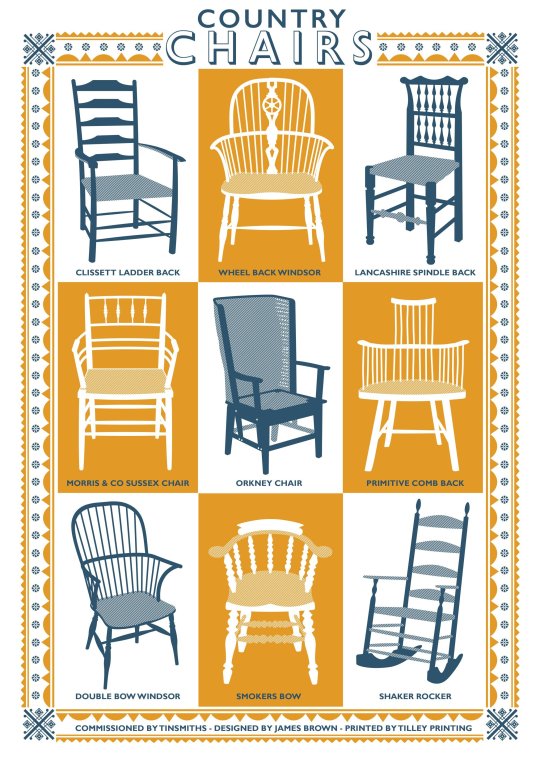
Country Chairs - James Brown
British , b. ?
print 29.7 x 42 cm.
#James Brown#american artist#chairs#shaker rocker#double bow windsor#Morris & co Sussex chair#orkney chair#rush seats
70 notes
·
View notes
Text
Here Are 20 Headlines Comparing Meghan Markle To Kate Middleton That Might Show Why She And Prince Harry Are Cutting Off Royal Reporters
Over the years, Meghan has been shamed for the same things for which her sister-in-law, Kate, has been praised.
Ellie Hall
BuzzFeed News Reporter
Last updated on January 13, 2020, at 12:00 p.m. ET
Posted on January 13, 2020, at 10:40 a.m. ET
The Duke and Duchess of Sussex (aka Prince Harry and Meghan Markle) didn't just shockingly "step back" as senior members of the royal family this week — they gave the UK media a big "fuck-you" for years of what they said was biased and unfair coverage.
The couple's new website on breaking up with years of royal protocol laid out — among a lot of other things — their media strategy, stating that they will no longer participate in the traditional royal press system that grants exclusive access to a select group of UK outlets.
Britain’s royal correspondents, they said, are seen as reliable sources of information. "This misconception propels coverage that is often carried by other outlets around the world, amplifying frequent misreporting," they wrote. Removing themselves from "royal rota" coverage has sparked an outcry among UK media and drew a protest from the National Union of Journalists.
This isn't a new complaint from the royal couple — they just took an unprecedented step to do something about it. Harry and Meghan have said publicly that they believe they have been treated unfairly by the UK press since the moment news broke of their relationship — that they are bullied, that there are racist undertones to coverage of them, and that they have been held to a different standard than Harry's brother and sister-in-law, the Duke and Duchess of Cambridge (aka Prince William and Kate Middleton).
The UK media outlets that currently make up the royal rota are the Daily Express, the Daily Mail, the Daily Mirror, the Evening Standard, the Telegraph, the Times, and the Sun.
Here is a look at 20 stories from these outlets that appear to show a double standard between press coverage of Meghan and Kate. BuzzFeed News has reached out to all of the outlets featured below for comment.
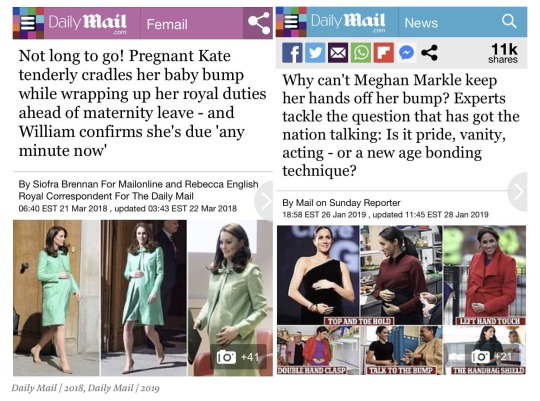
Kate: "Bumping along nicely! The Duchess was seen placing a protective hand on her tummy as she exited the event." Daily Mail: March 22, 2018
Meghan: "Personally, I find the cradling a bit like those signs in the back of cars: Baby on Board. Virtue signaling, as though the rest of us barren harridans deserve to burn alive in our cars." Daily Mail: Jan. 26, 2019
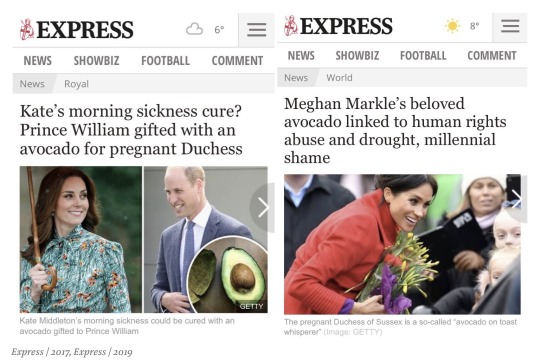
Kate and William: "Prince William was given one of the green fruit – wrapped up in a bow – by a little boy who's mother is suffering during her pregnancy too... 'He said he'd take it to [Kate] and see what happens – and said good luck for [the boy's] mummy.'" Express: Sept. 14, 2017
Meghan: "The pregnant Duchess of Sussex and so-called 'avocado on toast whisperer' is wolfing down a fruit linked to water shortages, illegal deforestation and all round general environmental devastation." Express: Jan. 23, 2019
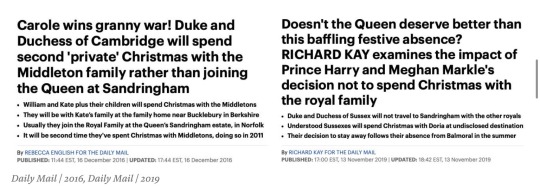
Kate: "Royal sources said yesterday that the Queen understood and endorsed William and Kate’s decision not to spend Christmas Day with her. One said: ‘Her Majesty understands that it is a dilemma that many young couples face and acknowledges how close Catherine’s relationship is with her family." Daily Mail: Dec. 16, 2016
Meghan: "The fact is the Queen expects to have the family around her for the festive season... to the Queen, for whom the tradition of the family gathering is a key date in her calendar, Harry and Meghan’s absence will be a matter of great sadness. It will also be a source of frustration." Daily Mail: Nov. 13, 2019
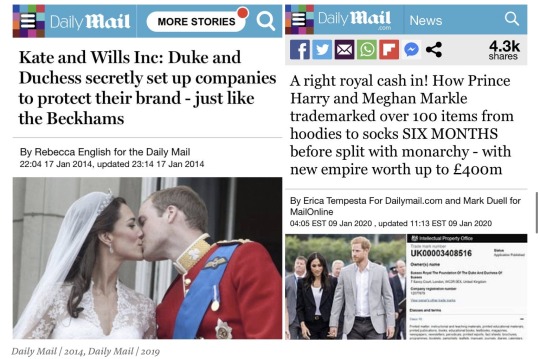
Kate and William: "Creating their own companies will allow William and Kate to bring out, should they ever chose to, myriad items of officially-endorsed merchandise from tea towels to coffee cups... Kensington Palace officials said they were doing the ‘sensible thing’ in protecting the couple’s rights." Daily Mail: Jan. 17, 2014
Meghan and Harry: "The Sussexes want to stamp their name on dozens of products including T-shirts, hoodies, journals and gloves for their newly-created foundation Sussex Royal... Experts said Harry and Meghan were actively preparing to quit the Royal Family months ago by filing trade mark applications to commercially protect their brand." Daily Mail: Jan. 9, 2020
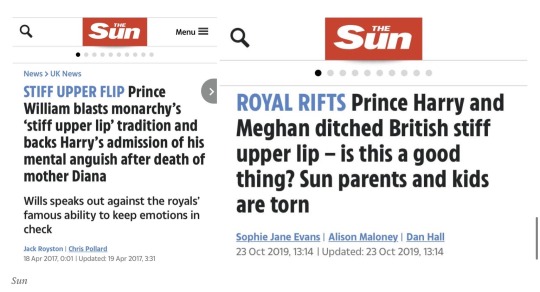
Kate and William: "Prince William yesterday backed brother Harry’s brave admission of his mental anguish — and blasted the monarchy’s 'stiff upper lip' tradition... William said: 'There may be a time and a place for the ‘stiff upper lip’ but not at the expense of your health... '
"'Catherine and I are clear we want both George and Charlotte to grow up feeling able to talk about their emotions and feelings. Over the past year we have visited a number of schools together where we have been amazed listening to children talk about some quite difficult subjects in a clear and emotionally articulate way, something most adults would struggle with. Seeing this has really given me hope things are changing and there is a generation coming up who find it normal to talk openly about emotions.'” Sun: April 19, 2017
Meghan and Harry: "Meghan Markle and Prince Harry have bucked royal tradition once again with their latest TV interview — in which they claimed they were 'existing, not living.' The couple ditched the stiff upper lip of previous Royal Family generations and flew the flag for 'Generation Therapy' as they revealed their emotions to the world - but were they right to do so?
"What you make of 'fragile' Prince Harry and Meghan's comments may depend on your generation. Sun parents and kids reveal what they think of the Duke and Duchess of Sussex airing their emotions in public - and whether they have the right to moan in such positions of privilege..." Sun: Oct. 23, 2019
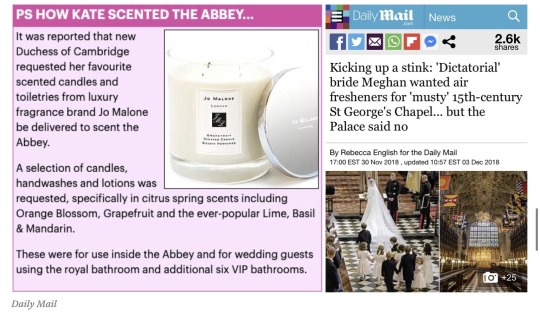
Kate: "It was reported that new Duchess of Cambridge requested her favorite scented candles and toiletries from luxury fragrance brand Jo Malone be delivered to scent the Abbey. A selection of candles, handwashes and lotions was requested, specifically in citrus spring scents including Orange Blossom, Grapefruit and the ever-popular Lime, Basil & Mandarin." Daily Mail: May 4, 2011
Meghan: "'Meghan wanted staff to go around with these atomizers, like spritzer guns, and spray the chapel with scent before anyone arrived. Royal Household staff stepped in and told her office politely, but firmly, that this was the queen's chapel and it simply wasn't appropriate. I don't believe they said no because they thought it could affect the chapel in any way. It was simply the principle of the thing. This is a place that has held royal weddings, funerals and even contains the royal vault. I don't believe a request of that nature had been made before.'" Daily Mail: Nov. 30, 2018
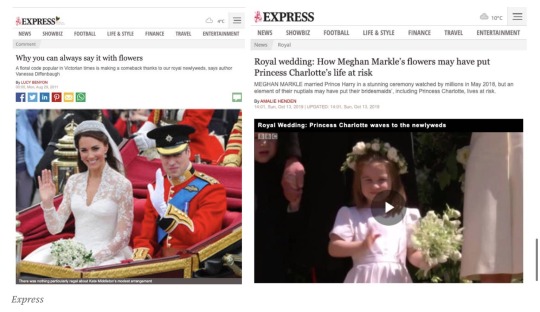
Kate: "As far as bridal bouquets go there was nothing particularly regal about Kate Middleton’s modest arrangement of simple, seasonal flowers. Like the bride herself the bouquet was effortlessly elegant and understated.
"Yet behind that modest posy lay a secret story. Kate, the commoner-turned-duchess, had painstakingly selected blooms with real meaning. She is evidently well-versed in the language of flowers, a little-known romantic relic from the 19th century.
"Hence the use of lilac in her bouquet, which signifies the first emotions of love, the lily of the valley meaning a return of happiness, hyacinth standing for constancy, myrtle meaning love and the ivy, which represents fidelity. Then of course there was the suitably named Sweet William, which is shorthand for gallantry." Express: Aug. 29, 2011
Meghan: "[Meghan Markle] was holding a wedding bouquet which flowers were replicated in Princess Charlotte and the other bridesmaids’ flower crowns. Express.co.uk can now reveal the children’ crowns were made of flowers that can be deadly, especially for children. Meghan’s bouquet was made of forget-me-nots as well as sweet peas, lily of the valley, astilbe, jasmine, and astrantia...
"Lily of the valley is a highly poisonous woodland flowering plant and ingestion could be deadly... As Meghan’s bridesmaids were so young, having this flower on their heads could be considered a dangerous decision. Other brides have also used this flowers including Kate Middleton, Princess Eugenie and Camilla, Duchess of Cornwall." Express: Oct. 13, 2019
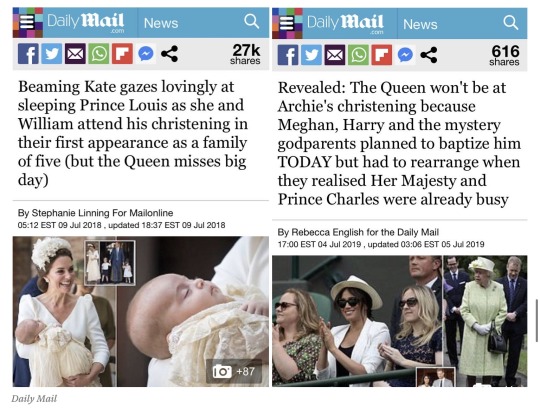
Kate and William: "The Queen and the Duke of Edinburgh missed the small family affair. The decision is understood not to have been taken on health grounds, and to have been mutually agreed by the Queen and the Cambridges some time ago. The Queen, 92, has a busy week ahead, with high-profile celebrations in central London marking the centenary of the RAF on Tuesday, and a visit by US President Donald Trump in Windsor on Friday." Daily Mail: July 9, 2018
Meghan and Harry: "The situation has surprised some senior staff at Buckingham Palace, who feel that the duke and duchess should have planned the day better. ‘There is huge support for the couple in not wanting to conform to tradition. They are young, they are striking out on a different path from other members of the Royal Family and there is enormous goodwill for them. But they shouldn’t do that without regard for tradition,’ said one. ‘Her Majesty was already scheduled to be in Scotland for her annual Holyrood Week and had a prior engagement at the weekend. There is a feeling amongst some that they should have been more accommodating about the date.’" Daily Mail: July 4, 2019
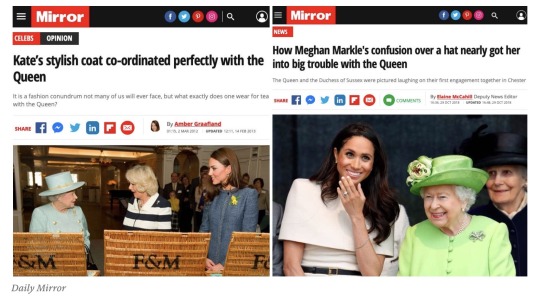
Kate: "It is a fashion conundrum not many of us will ever face, but what exactly does one wear for tea with the Queen? The Duchess of Cambridge met this challenge head on yesterday by co-ordinating her outfit with the Queen’s powder blue ensemble... The Queen, on her first official event to mark her Diamond Jubilee, was dressed in a pastel hat and two-piece coat dress with military-style rows of gold buttons designed by Angela Kelly. Looking relaxed and elegant, her outfit was perfect for what looked like a fun official engagement with the girls." Mirror: Feb. 14, 2013
Meghan: "The Queen's aides had told [Meghan] she would be wearing a green hat as a mark of respect to those who died in the Grenfell Tower fire. The Queen is said to have been 'baffled' when Meghan turned up without a hat as she didn't realize she was supposed to wear one too. A senior aide said: 'I don't think the Duchess fully understood. This was not a request. Those are for others to make, not the Queen.' The Queen's staff are said to have noted the Duchess's mistake or 'lack of deference'" Mirror: Oct. 29, 2018
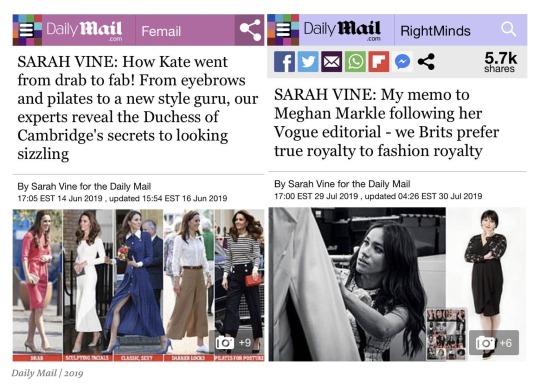
Kate: "We see a woman in her prime: stylish, confident and positively radiant, nailing outfit after outfit in the style stakes — and it’s a joy to witness... That old uniform of girlish dresses, tan tights and nude heels has been replaced by dazzling super-chic outfits to satisfy even the most exacting fashionista." Daily Mail: June 16, 2019
Meghan: "Proper royalty is about tradition and duty, self-effacing service and loyalty — year after year after year, season after season... That is not to say that a monarchy cannot or must not move with the times — simply that it has to resist the temptation to be buffeted by passing cultural trends. Fashion is the exact opposite. And as fashion’s most famous bible, Vogue exemplifies the transient nature of the beast." Daily Mail: July 29, 2019
#meghate#meghan markle#kate middleton#duchess of sussex#duchess of cambridge#double standards#brf#royal rota#tabloids#buzzfeed
125 notes
·
View notes
Text
Amoureux (c.s./d.s.) - Chapter Seven
A/N I think we need to start using #TeamChristian or #TeamDaniel...I need to know whose side you’re on 🤔

The Prime Minister was set to visit later that week for a formal dinner with the Royal Family. The day was spent with all of the butlers dusting and tiding the entire palace in preparation for his arrival, Anna and Daniel sent out into the garden to avoid reining havoc on the freshly cleaned rooms. Louisa and Christian spent most of the day inside, going over conversation points about the British government system in case any comments arose directed at the French princess. She was a quick study and managed to remember the basic facts with ease, although her eyes kept drifting out the sitting room windows to the garden where she could see Daniel and Anna playing in the trees. How she wished to join them rather than studying politics.
But Christian made it more enjoyable with his sweet smile and little anecdotes to help her remember things and of course his soft kisses that made the politics of it all that much more worth it. Louisa kept catching herself biting back her smile and glancing out the window after every time he kissed her.
The Prime Minister and his wife arrived early that evening, the Royal Family lined up outside the front doors of the Palace dressed in their best formal attire and ready to greet their guests. Louisa was, of course, placed beside Christian in their row of six, a small tiara placed on top of her soft curls, her light blue gown reaching the stone walkway and brushing up close to Christian’s black and white formal attire.
When the Prime Minister and his wife reached them, they were offered a bow and a curtsy, Louisa left with a kiss to her hand and a soft, “Your Royal Highnesses.”
Daniel, who was on Louisa’s left, was grouped with Anna with the more youthful of greetings to the children of the family. Louisa avoided looking at him to keep from laughing at his obvious unimpressed scowl.
Dinner was served right away, the Prime Minister now seated on Louisa’s left and his wife across from him beside Christian, the King and Queen moved down a seat each. The butlers brought out appetizers to the table and after saying grace, the meal began.
Louisa was asked about France by the Prime Minister’s wife, to which she answered excitedly all about her home country and how she missed it terribly. She made sure to mention how she was falling in love with England regardless. Christian sent her a small smile from across the table which she returned shyly, glancing back down to her salad.
“Well, I must say, you seem like a wonderful prospect for our future Queen, Louisa.” the Prime Minister’s wife smiled at her.
“Oh, thank you, ma’am.” Louisa blushed.
“A lucky catch for Christian, I must say.” the Prime Minister added.
“I agree.” Christian spoke up, keeping his eyes on Louisa’s soft smile from across the table.
“Have you decided where you will live once you marry?”
“I’m assuming still here at Kensington although Windsor Castle isn’t out of the running.” Christian answered.
Louisa focussed back to her salad, never having been included in any wedding conversation yet alone post-wedding plans. She figured it would come with time.
Daniel elbowed her and she glanced over at him.
“Not Windsor.” he whispered to her, keeping his eyes on Christian. “It is absolutely infested with ghosts.”
Louisa bit back her chuckle and hit it behind another forkful of her salad.
“I am serious. We visited there when I was seven and I swear-”
“Daniel.”
The youngest son looked over at his mother who was glaring at him.
“You know better than to talk over our guests.”
“My apologies.” Daniel said softly, a vast difference from his usually chipper voice, before looking back to his appetizer and mumbling a breathy, “God forbid I speak.”
Soon the appetizers were taken away and replaced with their steak dinner and the topic changed to recent goings on in parliament. They couldn’t go too in depth since many of the discussions in the House were private but politics never failed to rise as conversation at the Royal dinner table.
“Have you prepared well for your Head of State position?” the Prime Minister asked Christian.
“I believe so. Father has brought me into his office to break down the paperwork and expectations since I was little.” Christian replied lightly. “I believe I will have a good grasp on it.”
“Well it will not be for a while that you will be Inaugurated so there is no rush.”
“Of course.” Christian agreed. “We expect to keep Father around for many more years.”
Louisa pushed a piece of broccoli around her plate a little, reality setting in that she in fact won’t be made Queen until the current monarch passes and with him in such good health, that could be a long time. She would be sitting in a large house in a country that wasn’t hers without any solid role for however long.
Supper concluded an hour or so later and the group stood up to begin to make their way to the parlour. Daniel kept close to Louisa as they walked out of the dining room, setting a hand on the small of her back that sent shivers up her spine. She looked over to Christian as he started to join them.
“Fake ill. It will get you out of brandy and politics for the rest of the night.” Daniel whispered to her as they made it to the doorway of the parlour.
“I can’t. They’re here for me.” Louisa barely replied before Daniel was grabbing her arm and declaring to the room,
“The Princess isn’t feeling very well so I am going to take her to her room for the night.”
Louisa’s eyes widened at his outburst as everyone turned to look at them.
“You are feeling ill?” Christian asked quickly, taking spot on her other side and pressed a hand to her cheek.
“I have it under control, dear brother. Don’t worry yourself.” Daniel assured him quickly.
“My sincerest apologies.” Louisa spoke as straightly as she could to the room.
“We do hope you feel better.” The Prime Minister’s wife said kindly.
“Come find me if you need me at all in the night.” Christian whispered to Louisa before leaning in to press a quick kiss to her cheek. She simply smiled at him and let Daniel led her from the room.
When they were out of earshot, Daniel took off at a bit of a run, holding tightly to her arm as he pulled her after him.
“You’re crazy!” Louisa whispered sharply. “You just had me lie to the Prime Minister and your parents!”
“You could have pinned it on me without repercussions, but you didn’t.” Daniel retorted as they turned the corner into the main foyer. He made a beeline for the large double doors as if he was sent there with purpose. The guards on either side of the doors set their hands between him and the exit although neither were very large nor intimidating as you would expect from Royal Guards.
“Where are you two going at this hour?” the man on the left asked, his curly hair almost to the point of unruly if it wasn’t balanced out by his perfectly ironed uniform and shining shoes.
“For a breath of fresh air.” Daniel answered, looking between the two guards, his hand wrapped around Louisa’s arm still. She stayed quiet, nervous.
“And you, ma’am?” the second guard directed to her.
Louisa stared into his questioning brown eyes for a moment, “Um, yes, I, uh-”
“She doesn’t know much English yet, Zach, obviously.” Daniel cut in. “She isn’t feeling well so we’re going out for some air.”
“And your father is aware of this?” the first one asked.
“Jack, come on.” Daniel whined. “How could I sneak out the future Queen without my father knowing? He is aware. We have his permission.”
The guards glanced at each other, uncertain, and perfectly familiar with the second son’s antics around the palace as they were often the ones left to clean up the messes.
“You must stay in the gardens, do not go farther over the grounds as it is late and it is dark and we do not want to send out a search party.” Jack said sternly.
“Yes. Of course.” Daniel nodded quickly.
“And do not come back late. An hour at most.” Zach added.
“Understood.” Daniel bounced eagerly on his toes as the guards moved to the side and let him pass. Daniel pulled Louisa after him through the double doors and out into the main entrance of the palace, shouting his thanks over his shoulder.
“I know plenty of English, thank you very much!” Louisa snapped playfully at Daniel as he pulled her along the pathway around the side of the palace towards the gardens.
“They don’t know that, and you were blowing our cover! You are a dreadful liar.” Daniel retorted.
“So rude!” Louisa scoffed lightly. Daniel jumped over one of the flower beds and turned to help her over it after him, the bottom of her gown getting a bit of dirt over the hem in the process, and he took her hand in his and pulled her up a small grassy embankment.
“We are not permitted out of the gardens.” Louisa whispered as if they were being spied on.
“They’re not going to be watching us.” Daniel answered, his hand squeezing hers as the hill turned a bit steeper and he pulled her up after him. “Besides, it is not any fun to sit on a bench and stare at flowers in the dark.”
“That’s fair.” Louisa agreed as they reached the top of the embankment and it plateaued out in front of them. “Where are we going?”
“Right here.” Daniel pulled her onto the grass next to him almost under the branches of a willow tree.
Louisa smoothed out her dress as nicely as she could over the trimmed grass, her legs tucked under her and back straight. Daniel flopped backwards onto the lawn, staring up at the night sky. He looked at her when she didn’t move.
“Are you going to join me?”
“What are you doing?” Louisa chuckled, shuffling closer as she tried her best to keep herself decent, holding her dress down over her legs as she laid herself down on the grass beside him.
“Looking at the stars.” Daniel smiled, tucking his hands under his head as they laid together and stared up at the night sky, dotted with silver glittering stars.
“It is quite beautiful.” Louisa whispered.
“And the stars don’t bore you with politics.” Daniel added, making her laugh lightly.
“You really dislike politics, hm?”
“It is truly a waste of my time. Why concern yourself with the goings on of a whole country when you can concern yourself with your own things.” Daniel shrugged.
“Like becoming a famous composer?” Louisa questioned lightly, looking over at him.
“Exactly.” Daniel grinned, glancing at her for a moment before looking back to the sky. “None of those guys had to worry about the status of the currency.”
They fell into silence for a while, laying side by side, staring up at the sky in the summer breeze.
“Do you care about politics?” Daniel asked, turning to look at Louisa.
She took a moment to answer, keeping her eyes focused up as she found the words to politely reply, “It is not my first choice of an enjoyable topic of discussion but I will not be the one doing the work so I suppose it does not affect me either way. I am indifferent.”
“Oh, come on. I see your face when someone brings it up.” Daniel scoffed, looking back to the sky as well. “You look willing to die instead of standing through another long discussion on the colonies and parliament and whatnot.”
“That’s why I have you to come save me.” Louisa smiled at him.
Daniel met her gaze and returned her smile, “Of course.”
He bit lightly at his bottom lip before turning back to the sky, letting his hands rest over his stomach casually.
“I just wonder why your fiancé wouldn’t do that.”
“What do you mean?” Louisa asked softly, looking at him again.
“You’re obviously not interested in the conversation. I don’t understand why Christian wouldn’t make an effort to make you comfortable in a topic of conversation.”
“It is not that easy.” Louisa sighed, looking back to the sky.
“Sure, it is.”
“No. Christian is going to be King. He cannot change the topic of conversation every time someone asks him about politics, that would be quite dishonorable. Besides, I am simply the wife. I do not speak unless spoken to.”
Daniel’s annoyed groan made her frown a moment and she glanced back at him to see him rubbing his forehead with his hand in exasperation.
“What was that for?” she asked.
“It’s all fucking bullshit.”
His language took her by surprise. She was always raised to never swear as it was a sin and her brother was taught often especially not to swear in the presence of a lady. Daniel seemed to constantly be an exception to the rules. Louisa waited to let him continue.
“This whole thing.” Daniel sighed, turning onto his side to face her, tucking his arm under his head. “Manners and being societally accepted depending on how you carry yourself. Don’t do this or do this in order for someone to want to respect you. Daniel, don’t speak at dinner it is terribly rude to have opinions.”
“I think there is a proper amount of respect and manners someone should have. I should be able to stand beside my husband and let him talk about his future.”
“But you don’t enjoy it.” Daniel retorted.
“Well…not entirely. But it is important.” Louisa shrugged.
“Christian doesn’t deserve you.”
“Oh.” Louisa laughed through a scoff.
“I’m serious. He wants so badly to be King that he doesn’t see that you’re not enjoying yourself.”
“It is not about me enjoying myself it-”
“So you want to be bored and lonely the rest of your life?”
“Daniel.”
“He doesn’t deserve you.” Daniel repeated strongly. Louisa sighed and sat up, folding her hands in her lap. “He doesn’t.”
“He does.”
Daniel sat up with her, “He won’t have fun with you. He doesn’t know what fun is. I saw your face in the gallery…you did not want to look at colour on canvas for one more second!”
“Daniel-” Louisa laughed softly.
“I might just go absolutely mad.” Daniel cut her off at a whisper.
Louisa’s smile faltered a moment as they stared at each other, the cool summer breeze rippling her strawberry blonde curls over her face. Daniel reached over to tuck them behind her ear. His fingertips danced down her cheek as if trying to memorize her, his eyes falling across the curve of her jaw and over her soft features.
“Daniel.” Louisa whispered slowly; her eyes focused on his face.
His hand moved to hold her chin ever so delicately, an action so unlike his seemingly fast-paced lifestyle, and he leaned in to kiss her.
The fact that she let him took Louisa herself by surprise, but even still, butterflies erupted in her stomach as his lips met hers. They sat motionless for a moment, like they knew they were treading in dangerous waters, before Daniel pulled back slowly. Their eyes opened to meet each other’s gaze, Daniel’s expression seeming as if he felt the butterflies too.
Louisa knew better than to fall for it, to go against everything she had been warned about before leaving for England, but the feeling was intoxicating and she leaned in again for another kiss, moving her hand to his cheek to hold him close. Daniel smiled softly against her lips, sliding his arm around her waist as she melted into it, his fingers resting over the lace trim of her ballgown and rubbed soft patterns with his thumb over her back. Louisa felt absolutely on fire, an indescribable warmth radiating up her arms and over her body from just the feeling of his lips on hers, as if she never wanted to let him go.
The guilt started to overpower the bliss and Louisa broke their chasté kiss with a small sigh despite not being able to wipe the grin from her face, dropping her hands back to her lap. Daniel sat back again, pushing a hand through his hair almost shyly, a blush coating his cheeks as he stared at her silently.
“We should go back inside.” Louisa whispered, biting her lip to keep from smiling too widely, and to try and lessen the tingle that their kiss left behind.
Daniel couldn’t help himself as he leaned in to kiss her once more, cupping her face in one hand, the other holding himself up against the grass.
“Daniel.” she laughed lightly against his lips, pushing him back by a hand against his chest. “We need to go back inside.”
“Okay.” Daniel smiled. He got to his feet and held out his hand to help her up and she smoothed down her dress with her other hand. They walked hand in hand back towards the palace doors, their own child-like smiles on their blushing faces. Louisa stopped him before they turned the corner to the front of the building.
“You won’t tell anyone about this, right?” she asked softly.
“No.” Daniel shook his head, giving her hand a squeeze. “I won’t.”
Louisa smiled thankfully at him and pressed a kiss to the corner of his mouth before dropping his hand and leading him back into the palace. Daniel watched her make her way upstairs and into her room before he had to go back to his family, ready to lie through his teeth over his whereabouts. Louisa’s heartrate took a while to steady itself before she could even think of sleeping, her brain flipping between giddy excitement and sickening guilt until sleep overtook her.
#why dont we#daniel seavey#christian seavey#jonah marais#corbyn besson#jack avery#zach herron#wdw#limelight#royal!wdw#why dont we imagines#why dont we fanfic#daniel seavey fanfic#daniel seavey imagines#historical fiction#wdw fanfic#wdw imagines#why dont we music#👑
28 notes
·
View notes
Text
Something Domestic: Chapter 7
A/N: Hey y'all! This is a new TRR AU I’ve been working on. This story is told in first-person narrative, from Riley’s (MC) POV. There will likely be smidges of canon in this, but not too much. Thanks for reading, and please leave feedback, and/or if you would like to be tagged.
Catch up here
Series Tags: @burnsoslow @aworldoffandoms @dcbbw @ladyangel70 @texaskitten30 @sunandlemons @jlynn12273 @indiacater @jared2612 @rainbowsinthestorm @drakesensworld @badchoicesposts @msjr0119 @katurrade @blackcoffee85 @cynicalworlds-blog @hopefulmoonobject @beardedoafdonutwagon @cmestrella @sugarandspice-milkandhoney
Synopsis: When Riley Brooks takes a new job as a nanny for the affluent Rhys family in New York’s Upper East Side, she assumes she’s just going to care for the children of the couple who hired her. But instead of just school pick-ups and afternoon snacks, she also finds herself spending time with Liam, the handsome divorced dad. Can Riley control her feelings for Liam while still performing the job she was hired for?
All characters are the property of Pixelberry Studios. Thanks for allowing me to borrow them.

Chapter Summary: Riley takes the kids on a playdate, and learns a startling secret.
My first week on the job goes by surprisingly quick. Before I know it, Friday has arrived. Liam and Madeleine have already left for work and I’m getting the kids ready to start the day. Before she left, Madeleine informed me that she set up a playdate for the kids with some friends of hers. And after the incident in the park on Monday, Liam hired security detail for me, much to my chagrin. Mara — my new bodyguard — sits in the kitchen sipping a cup of coffee while I wash up the dishes from breakfast.
“Riley? Can we go to the zoo today?” Charlotte asks between bites of scrambled egg whites.
I stop washing the frying pan in the sink and turn to her. She looks at me with those emerald eyes, the same ones her mother uses to judge my every move. “Your mommy actually set up a playdate for you and Philip today. So we’re going over to see the Auvernal twins.”
Charlotte frowns. “I don’t like them. They're mean. Amelia doesn’t share her toys and Henry spit on me.”
Oh boy. This is going to be fun. Why am I not surprised that Madeline’s friend’s kids are brats? Before he left this morning, Liam did mention that Bradshaw and Isabella were a little too “hoity-toity” for his taste. Whatever that means. I guess the Ruby Red doesn’t fall far from the tree. I finish washing the pan and drain the sink, placing the sponge on the back and dry my hands.
“I’ll be there the whole time to make sure they are nice to you. If there’s a problem, Mara and I will take care of it.” She looks to Mara, then back at me, and nods then shoves a forkful of eggs into her mouth. Philip picks at his bowl of yogurt parfait, eating only the blueberries and strawberries. Yogurt is smeared on his cheeks.
”Can we go to the park again and see Mr. Toad? I miss him,” he asks.
I grimace. After the incident on Monday, I was forbidden by Madeleine from taking them to the park without prior approval. ”Uh, your mommy doesn't want us to go to the park for a while, bud. So, we're going to have to think of something else to do afterward. Maybe I can text her and see if we can go to the Children's Museum after your playdate.”
The kids finish up their breakfast as I pack up their travel bag. Mara gets on her phone and calls Bastien to bring the car around. Once everyone is ready to go, we make our way downstairs to meet him. Mara helps me fasten the kids into their booster seats, and waits for me to climb in after them, then takes her place in the front seat. As we make our journey to the Auvernal’s penthouse, the kids argue over who will be stuck playing with which twin. Jesus, these kids must be a nightmare.
Twenty-five minutes later, we arrive at their penthouse in Tribeca and I usher the children to the Auvernal’s quarters. A man in a waistcoat, grey striped trousers, a white Windsor cut shirt, and a black tie greets us and escorts us to a private keyed elevator. Once we reach the top floor, the door opens directly into an expansive foyer and my jaw immediately drops. This place is amazing! A gracious living room is accented by floor-to-ceiling windows and the terrace overlooks the iconic Tribeca architecture. The floors are Brazilian wenge hardwood, and a custom built-in wood-burning fireplace gives the room an elegant yet intimate feel.
As we are guided through the kitchen, I take in the granite countertops, white wood cabinetry, the Viking and Sub Zero appliances, and a 12-foot marble island. I’m pretty sure the fridge costs a month’s rent. The butler leads us into a playroom area attached to a bedroom suite with a private balcony.
“Master Henry and Mistress Amelia will arrive shortly,” he says before bowing and exiting the room. The kids and I take a seat on the plush leather sofa in the room, while Mara stands guard outside the door. A few minutes later, a young woman in a royal blue cardigan over a black tea-length dress enters, followed by two young children. The boy has brown eyes, short sandy brown hair, and tan skin. He is wearing a navy blue suit jacket, white dress shirt, and charcoal grey pants. The girl also has brown eyes and tan skin, but her hair is dark brown and pulled into a high pony wrapped in a lavender bow. She is wearing a lavender sundress under a white cardigan.
I rise from the sofa. “You must be Amelia and Henry. I’m Riley.” The children eye me skeptically, looking to their nanny for guidance. The young woman nods.
“Manners, children. What do we say when we greet our guests?” she snaps in a thick French accent and moves toward me, extending her hand. “Hello, I am Bridgette. The children’s au pair. So nice to meet you, Riley.”
Henry and Amelia move towards where Charlotte and Philip are sitting. “Hey, Philip. I got a new train set. Wanna play?” Henry asks. Philip nods and the two make their way to the corner of the room, where a huge toy chest sits. Amelia grabs Charlotte’s hand and drags her to the other end, to a larger-than-life dollhouse. The children laugh and play as Bridgette and I take our seats on the couch. I watch them for a few minutes, making sure everything is going smoothly. Philip and Henry take turns hooking up cars to the train and snapping pieces of the track together. On the other side of the room, Charlotte and Amelia hold a fashion show with their Barbie dolls.
These kids don’t seem so bad. Maybe I misjudged them. The butler from earlier enters the room, carrying a tray with a teapot and two teacups. He sets the tray on the coffee table in front of us and pours a cup for Bridgette and I, before bowing and exiting the room. Bridgett and I get to know each other as the kids play. I learn that she is also an education major and is studying abroad at Steinhardt, my alma mater. She tells me about living in France and asks me if I've been. I give her pointers about what classes to take and fun things to do while she's here.
After about an hour, I excuse myself to use the bathroom. The butler — whose name I learn is Nigel — escorts me to the “guest” bathroom. And by “guest,” I mean holy shit! This bathroom is bigger than my entire apartment. The five-fixture bathroom has bluestone and marble finishes, double sinks, a Duravit soaking tub, and separate shower stall. There is also a stunning Bec Brittain tailored light sculpture hanging from the ceiling and a large walk-in closet with custom Poliform cabinetry. This is so over-the-top for a guest bathroom, I can only imagine what the rest of the penthouse looks like. I finish up and head back to the playroom, and as I reach for the door handle, I hear the sounds of children arguing, followed by Bridgette scolding in French. I sigh deeply and roll my eyes before pushing the door open. I enter and find Philip and Henry playing tug-o-war with a G.I. Joe action figure, while Bridgette attempts to break them up. The discarded remnants of the train set they were playing with earlier lay scattered on the floor.
”These are my toys! You can't play with them!” Henry screams.
”You weren't even playing with it, ” Philip replies as tears streak down his little cheeks.
As I move over to assist Bridgette with the boys, I hear a shriek from across the room. I whip my head around to see Charlotte gripping her arm, and Amelia yanking a Barbie from her grasp.
”She bit me!” Charlotte cries as Amelia scowls and clutches the doll to her chest.
”Okay, kids. That's enough for today. Let's say goodbye to Amelia and Henry, ” I say, gathering their things. Bridgette looks at me apologetically as I escort the children out of the room. With Mara trailing, I nod goodbye to Nigel and head out.
During the car ride home, I comfort Philp and examine Charlotte’s wound. The bite mark wasn't enough to break the skin, but it clearly upset her. Who knew a couple of five-year-olds could be such assholes? I’ll definitely have to tell Liam about today. When we arrive at the Rhys penthouse, we bid Bastien goodbye and make our way inside. A half-dozen paparazzi litter the sidewalk outside the building, snapping our photos. I do my best to ignore them and usher the kids upstairs. The kids make their way to their playroom and I plop down on the sofa in the living room, sighing loudly.
“Everything alright, Miss?” Mara asks.
“Yeah. It’s just that dealing with those bratty Auvernal kids was exhausting. No wonder Charlotte didn’t want to play with them this morning.”
Mara smirks. “Makes you want to have kids of your own someday, huh?”
I laugh sarcastically. “Hopefully my kids will be raised better than those little dickheads.”
Just then, Philip comes ambling down the stairs “Riley? I’m bored.”
I rise from my seat and walk over towards him. “Do you want to color? I have some art supplies in my bag.” He nods and I head to the kitchen and retrieve a sketchbook and the 80-piece art set I carry in my tote bag. I tuck a stack of old newspapers under my arm and lead him upstairs into the playroom. I find Charlotte sitting in a chair, flipping through a pop-up book. She looks up and notices the art set in my hand, her eyes growing wide.
“Is that paint?” she asks, setting the book down.
I smile and open it up showing her the collection of crayons, colored pencils, watercolor paints, and paintbrushes. She jumps up and runs over to me, looking at the set in awe. I take the newspapers and lay them down on the floor, so as not to get paint on the carpet. I tear a page out of the sketchbook for each kid and pass them out. “When you guys are done, we can hang these on the fridge for your mommy and daddy to see.”
The kids begin creating pictures, as I pick up the toys scattered throughout the room. After a few hours and several Picassos later, I gather up the supplies and help the kids to clean up. I notice Charlotte’s hands, arms and legs are covered in paint. “Looks like you need a bath, missy. Run along into the bathroom and I’ll help you wash up” I tell her. She giggles and takes off towards the bathroom. I grab an iPad from the entertainment center and open up the Dopey Cat app. I then hand it to Philip. “Can you hang out here for a bit while I give your sister a bath?” I ask. He nods, too engrossed in the game to respond. I chuckle and make my way to the bathroom. Charlotte is already there, her shoes, socks, and dress scattered all over the bathroom floor. I run a bath for her and help her into the tub. Once she’s situated, I grab the shampoo and begin washing her hair. She mimics my actions, washing the hair of her Barbie doll. I grab the detachable showerhead and start rinsing the shampoo from her hair.
“Are you excited to start school next week?” I ask. She nods and continues bathing her doll. She then stops and turns to me.
“Riley? Are you my daddy’s new friend?
I shut off the water and set the showerhead aside. “I’m your nanny, sweetie. I’m yours and Philip’s new friend.”
“Are you going to be staying with us for a while?”
“I am. For as long as your mommy and daddy want me here.” I reach for a loofah and body wash and begin washing the paint off her arms and legs. She nods and dunks her Barbie’s head underwater, washing the shampoo from her hair. “What about Mommy’s friend? Is he going to be staying with us for a while?”
“Uh...I guess that depends. Who is your mommy’s friend?”
“I don’t know. He came over the other night when Daddy was still at work. Mommy kept calling him ‘baby’ but he’s too big to be a baby. She made us go in the playroom and then they went into Mommy’s room and didn’t come out for a long time. Brother and me could hear her crying. I think he was hurting her,” she frowns.
“Does Mommy have friends over a lot?”
“Sometimes. One time she had two ladies over. They sat in the living room and drank grown-up juice. Another time she had her baby friend over. They hung out in her room the whole time.”
My fists clench. I can’t believe Madeleine is bringing her booty calls to the house. And around the kids. Oh, wait, yes I can. Poor Philip and Charlotte. And poor Liam. I’m appalled at the nerve of this woman. I take a deep breath and finish rinsing Charlotte off, before pulling the drain stopper. She gets out of the tub and I wrap her in a fluffy yellow towel. I lead her to her bedroom and help her slip on some clean clothes. After a few minutes, I hear Philip knock on the door. “Riley? I’m hungry.”
I pull my phone out of my pocket and check the time. 5:18 p.m. “Your mommy will be home from work soon, but we can grab a snack for now.” We head downstairs to the kitchen and I grab a jar of peanut butter from the cabinet and apple slices from the fridge. I put everything into a bowl and set it on the table for the kids. As they eat, I take a seat next to them and rest my head in my hands. I think back to what Charlotte told me in the bathroom. Do I tell Liam? Or do I keep my mouth shut and mind my own business?
Ugh. This was not part of the job description.
#something domestic#trr au#trr fanfic#playchoices fanfic#riley brooks#liam rhys#nanny au#nazariolahela fanfic
58 notes
·
View notes
Text
royal raffoler. v
sirius x royal! reader
notes: part fiiiiiiive :) tank you all so much for reading and investing in this story. this part is short, but at least it’s something. hope you enjoy!!!! xoxo
warnings: none
word count: 1.3k
masterlist
series masterlist

Dear Margery,
Hogwarts is great! I really do enjoy it. I knew I would, but I thought you were exaggerating a little bit. My first week has been very strange, in the best way possible. It took a few days to convince people to stop treating me like I was a member of the royal family, but it actually feels like I’m living a normal life now. Well, besides the whole magic thing. I don’t really have any friends, which I kind of expected. Everyone in my year has basically grown up together, and I’ve known them for eight days. The prefect that showed me around was nice. His name was Remus. He told me I could talk to him and his friends any time I needed to, but I think he was just being nice. I hope you’re having fun without me.
Love,
Y/n
———————————————————————
“Did you see the look on his face?” James wheezed, doubled over in laughter. Remus looked at him, a disgusted look on his face at the food spilling from his mouth.
“It helps to swallow,” Remus was ignored. James and Sirius had been like that all morning, giggling amongst themselves at the situation their peers were in. Every time someone would bow or curtsy at y/n, the pair lost it.
“No no no, did you see that first year from Ravenclaw? I swear to Merlin I thought she was going to kiss her shoes,” Sirius chuckled. James clutched his stomach, leaning his head over onto Sirius’ shoulder. Sirius wiped the tears from his eyes.
“Remus is right you know,” Peter informed the two boys, who were still coming down from their laughter high. “Swallow, then speak.”
James rolled his eyes. “You know, if I didn’t know you two loved me, I’d think you were absolute gits.”
Remus smiled mockingly, rolling his eyes and turning back to the Daily Prophet. As James turned towards Peter, scheming their next prank, Sirius’ eyes began to wander. They landed on the Hufflepuff table, and he smiled when he saw y/n, something he had made an unconscious habit of doing. When he saw Ted Tonks talking to her, he felt unnecessarily jealous.
“Prongs,” Sirius broke the silence, causing James to jump. “What’s so special about the royal family anyway?” he questioned. He still didn’t get it.
“They assist in ruling the country, you twat,” James rolled his eyes, turning back to Peter.
-
“Wait, you already know magic?” Ted Tonks asked, a bewildered look on his face. He had been very nice to y/n since her start in Hufflepuff.
“I do. I didn’t just sit around for five years while you lot learned everything. I still practiced magic, just not publicly,” she told him, a hint of amusement in her voice. He nodded, before turning back to his food.
Y/n pulled out her schedule and glanced over, as she did everyday, still not having adjusted to her schedule.
Friday - Double Potions
Y/n had yet to have Potions, but had met the teacher. He was very interested in her. She was at first confused of this, but was then informed of his ‘Slug Club’. She promptly decided that joining would probably not be in her best interest.
Navigating her way to the dungeons had been a bit of a task. Remus had shown her the way when he gave her a tour of the school, but then the staircases moved and y/n got incredibly discombobulated. She wondered if he was okay, he looked pretty battered up during breakfast. He had seemed to be making his way back to the Gryffindor common room when y/n saw him last.
———————————————————————
Upon entering the Potions classroom, the Marauders were met with a predicament. There were usually four of them, which meant everyone had a partner. James and Sirius were always attached at the hip, and Peter and Remus worked incredibly well together. It was always the day after a full moon that ruined their seating chart.
James was the first to sit. Plopping down, he propped his feet on his desk. They were swiftly pushed off by Lily Evans as she walked by, glancing over her shoulder with a warning glance. James smirked at her and winked.
As Sirius went to sit down, assuming the seat would easily be his since James was occupying the one next to it, he was quickly cut off. Peter maneuvered around him and sat down, pretending like he hadn’t seen Sirius. Sirius, dramatic as ever, stomped his foot, throwing himself onto the tabletop behind the pair.
“Off,” Slughorn spoke, walking behind Sirius to the front of the room, not even glancing at the boy. Sirius cringed and sat in the chair, making sure everyone knew he was sitting “ all by himself, with no one to occupy him” and that he would “die of loneliness”. He tapped Peter on the shoulder and flipped him off.
Y/n Windsor walked into class and noticed that there weren’t any open single desks. Ted was sitting with Dorcas, who he had told y/n “was close with Andromeda”. All the seats next to her dorm mates were full. Y/n would have to sit with a stranger. She scanned over all the desks one more time and found one that only contained one person.
However, that person was the last person y/n wanted to sit with. He was very handsome, the most handsome boy y/n had ever seen. Everything she’d heard about him from her dorm mates was not very nice. A favorite was that he was a ‘wanker’.
She had also figured that he didn’t like her very much. She would always see him laughing amongst his friend group, before turning to look at her. She could only assume this meant Sirius was laughing at her. Each time, he would smirk very smugly, before turning back to his friends. Each time, it sent a chill down y/n’s spine.
She said a quick prayer in her head, then stood tall and walked over to the raven haired boy. She stood beside him for a second, then coughed, causing him to snap his head up. He raised a questioning eyebrow, eyeing her up and down.
“Is this seat taken?” she asked, the confidence she thought she had never appearing, instead a soft voice coming out. Sirius smiled.
“Why of course not, Your Grace!” he bellowed in a mock posh accent. Sirius stood, making a show of pulling out the chair beside his, before kneeling and placing his hand outwards for her to hold. The classroom erupted into giggles.
Y/n quickly averted her eyes and walked to the back of the class, where she had seen an old broken desk. She quickly sat down her things and plopped down. She angled her head downward and allowed her hair to fall, shielding her from the view of her mocking classmates. Maybe he was a wanker after all.
When the laughter died down, and Sirius was done soaking it all in, he turned towards her. He wasn’t trying to be mean. It was a joke, sure, but not a rude one. He assumed that she just didn’t want to sit next to him. Maybe she was stuck up after all.
taglist: @pottair @theravenclawlover @party-like-its-2013 @daughter-of-chaos11 @unsureem02 @sleep-i-ness @queenrrogertaylor @clockworkherondale @songforhema @frenchzodiacgirl @givemeanorigami
#harry potter#marauders#jamesmydeer#marauders hc#harry potter imagines#harry potter hc#harry potter imagine#sirius black x reader#sirius orion#sirius imagine#sirius black imagine#sirius black imagines#sirius black hc#sirius#sirius black
177 notes
·
View notes
Text
Vermeer
Inside my copy of Ludwig Goldsheider's Phaidon Press Vermeer I wrote my name and the date of purchase, 1958. I was then fourteen years old. The battered volume is a record, therefore, of an attraction to this artist that stretches back to childhood. Not unnaturally I would like to find a way to acknowledge all that he has meant to me over the intervening years. I have no gift to write of his art like Lawrence Gowing - still less like Proust - but in any case my preference is to use connoisseurship to extend, if possible, our understanding of his oeuvre by seeing if there are viable addenda that can be appended to it; and that is the main purpose of this Study. A secondary aim is to draw attention to the dangers involved in 'cleaning' what we already have. By way of caveat I urge any readers I may have not to expect everything adduced to look like their idea of 'a Vermeer'. Connoisseurship has to allow for development. An early Cézanne does not look much like a late one.
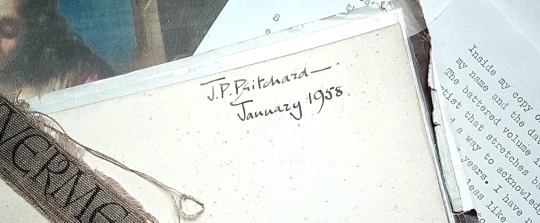
To begin at the beginning of Vermeer's career as a painter is chronologically proper but somewhat frustrating because we know that he is farthest from where he needs to be and where we wish him to be. Through his and his father's picture-dealing he comes into contact with Italian paintings of a religious and mythological nature which encourage him to try his hand in a similar vein. What survives of this derivative, experimental period is the St Praxedis - his version of a composition by a Florentine artist Felice Ficherelli - and the Diana and her Companions.
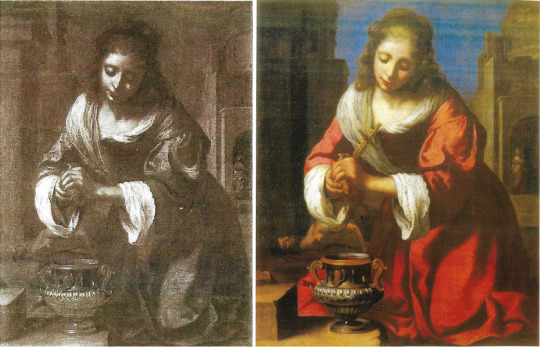
St Praxedis by Ficherelli (left) and Vermeer’s copy (right)
Being by Vermeer, these are not bad pictures; indeed the St Praxedis is that rare thing, a copy better than its original. In both works there is a fluency of brushwork, a Baroque rhythm, and a palette that at this stage includes a yellow, a deep blue, a winey brown, and a rose red that, mixed with white, becomes a violet.
I can only suggest one work to add to this early phase of Vermeer's oeuvre and that is a picture of the head and shoulders of a rosy-cheeked girl.

Portrait of a Girl by De Bray (left) and detail of St Praxedis (right)
When it passed through the hands of a London dealer (Chaucer Fine Arts) in 1989 it was attributed, not very accurately, to Jan de Bray. The face is painted in a style hard to reconcile with any of the young female faces in later Vermeer, but it does seem close to that of St Praxedis and to the facial types in the Diana picture. Common to all of them are the rose-white-violet juxtaposition, the swirling drapery and soft sfumato.

Christ at the House of Mary and Martha (National Gallery Scotland)
With the large ‘Christ in the house of Mary and Martha’ at Edinburgh we may be moving backwards rather than forwards chronologically, but Vermeer seems recognizably more Vermeerish. He is still in his broad-brush Religion and Myth phase but the religion is as domesticated as it can be in that story of Mary and Martha, so one feels that he is moving towards the territory that he will make his own. Even in the earliest pictures it is noticeable how women predominate as we know that they will in the future. On the relative merits of Mary’s life and Martha’s, Vermeer's art is, and remains, tacitly neutral: it pays tribute to both. As if to illustrate this there is a study in watercolour for the figure of Mary, and a drawing that is not for the figure of Martha (being stylistically later) but certainly alludes to her servant role.
In the Printroom at Leipzig is a remarkable wash drawing which Bernhard Degenhart included in an anthology of European drawings (Europaisches Handzeichnungen) published at Dresden in 1943 as the work of the landscapist Jan Siberechts.
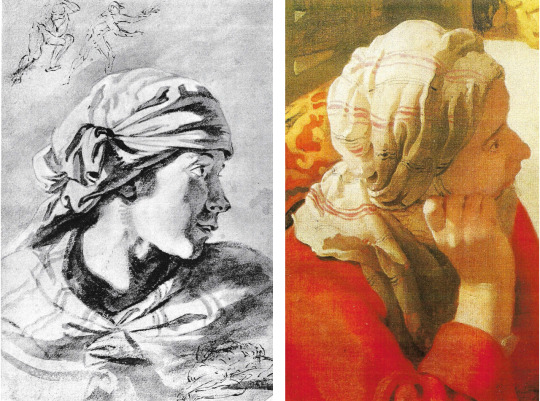
Drawing attributed to Siberechts (Leipzig) and detail of Martha
That attribution can be dismissed because there is nothing in Siberechts to support it beyond the flimsy fact of there being a landscape drawing on the verso. The little pen sketches of figures at the top and lower right of the sheet are by another artist; disregarding those, I think that there is a strong possibility that what we have here is a study by Vermeer for the figure of Mary in the Edinburgh picture; there the listening head is swivelled a little further round towards Christ. The light in consequence falls differently, but otherwise the similarities are close: there is the same profile with slightly parted lips, the same headcloth with the same striped pattern on it, and the same bright lighting from our left if we allow for the turn of her head.
It is the dramatic lighting, with maximum contrast in the folds of drapery and in the face too, not of Mary in the picture (now in shadow) but of Martha, that most accosts me. I notice as well the jugular vein in the neck of Christ. The wash is applied quickly but with complete assurance. The shadowed area of the face is conveyed in a manner that looks forward to the shadowed halves of the two heads in Washington, the Girl with a Red Hat and the Girl with a Flute.
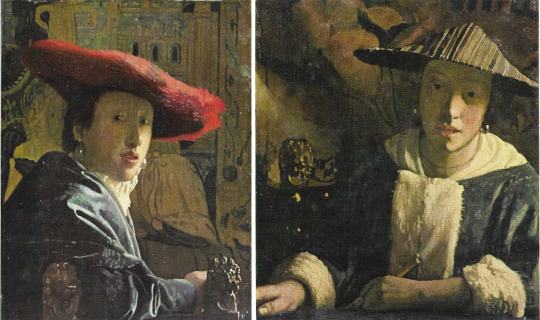
Girl with a Red Hat (left) and Girl with a Flute (right) (National Gallery Washington)
The strange wavy border that the bright light creates on her cheek, from the near edge of her eye down to her chin is typical of Vermeer’s observation of light, how it produces form, without line, in the most surprising ways. In this respect the Leipzig drawing seems more advanced and prophetic of his future powers than the painting.
The Leipzig drawing, as we have seen, is scarcely a drawing in the linear sense at all, but at Besançon there is a sketch of a more conventional kind. In what becomes his favoured graphic medium - black chalk heightened with white on blue paper - it shows a servant holding a shallow circular basket or tray.

Woman with Tray signed ‘De Hoogh’ (De Hooch)
She is probably not a study for Martha, but one can see the folds of her sleeve following the pattern of light and shadow that is distinctive at Edinburgh in the sleeves of all three participants but more particularly on Christ’s outstretched arm. Her face has the signature oval shape and high-arched brows.
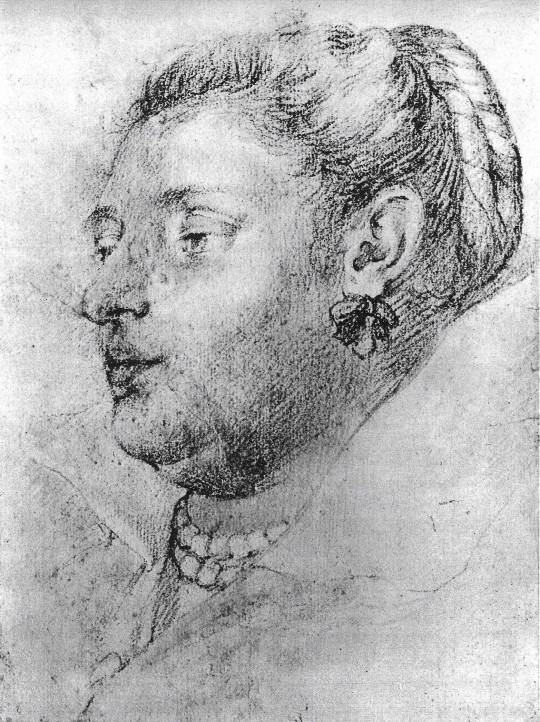
Portrait of a Lady (Royal Collection Windsor)
A third drawing may still be quite early but marks a change to something less loose, less generic, much more personal. This is in the Royal Collection at Windsor, a ‘Portrait of a Lady, Anonymous, Flemish school 91/2 x 7in, black chalk on white paper with red chalk for the flesh and the necklace of pearls’. The cataloguist comments that it is the ‘work of a follower of Rubens lacking peculiar characteristics’. If we stop thinking about Rubens, perhaps its characteristics will start to seem more peculiar, and peculiar, I suggest, to Vermeer. It is likely to be later in date than the Edinburgh picture, but the similarity of facial features if we compare the profile of this middle-aged woman with that of Christ is, for me, compelling.
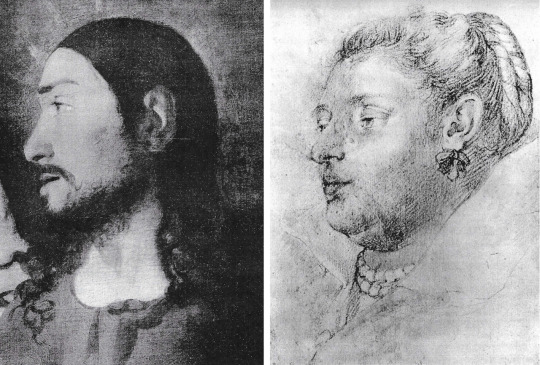
Detail of Christ at the House of Mary and Martha (left) and Portrait of a Lady (right)
It cannot be proven but my hunch is that this tender portrait is of Catarina Bolnes, Vermeer’s wife, bearer of their many children, and also likely model for the painting at Amsterdam of the pregnant Woman in Blue reading a Letter.

Woman in Blue and detail of face (Rijksmuseum)
Placing her tête-a-tête with Christ and putting aside the double chin so truthfully recorded, notice the mouth, the cupid’s bow upper lip and projecting lower, the depth of the upper eyelid, and the straight nose that nevertheless marks where the bone ends and softness begins. As for ribbons and pearls, they are fashion accessories worn by women in the paintings of other Dutch artists, so their presence in this drawing can only be corroborative evidence; still, we know from later paintings by Vermeer how much he liked his family members to sit or stand for him wearing these adornments, particularly pearls because they represented drops of light.
Whether or not I am right about Catarina, this sensitive, fairly rapid sketch does demonstrate that Vermeer needed to make drawings of his models. The camera oscura was invaluable for helping to accurately determine how furniture and figures are disposed within a chosen perspective, but that tool does not solve everything and I always thought it probable that for the faces at least he would have made some preliminary studies in chalk or oil paint on paper, even if no such drawings survived. Fortunately, as already suggested, a few have, and this is a particularly beautiful example.
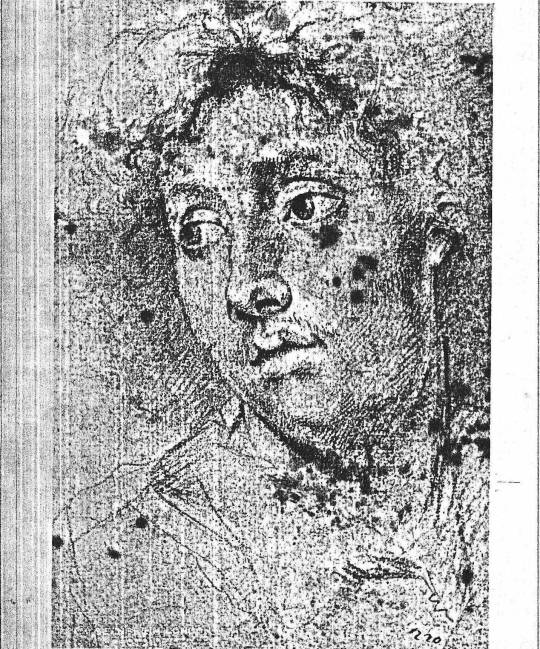
Portrait of a Young Man - Anonymous
At Rennes in France there is another close-up drawing, of a youngish man's face, his eyes directed down to our left as we look up. This is texturally very similar to the Windsor drawing, but it more particularly demonstrates three features found in the paintings. One is the drawing of the eyes, the almond shape of the eye itself, the broad strap of upper lid, and the elevated brow. This is famously clear in the Girl with a Pearl Earring at the Mauritshuis, but also in the Kenwood Girl with a Guitar, the Wrightsman Study of a Young Woman (Metropolitan Museum NY) and the two close-ups at Washington, Girl with a Red Hat and Girl with a Flute.
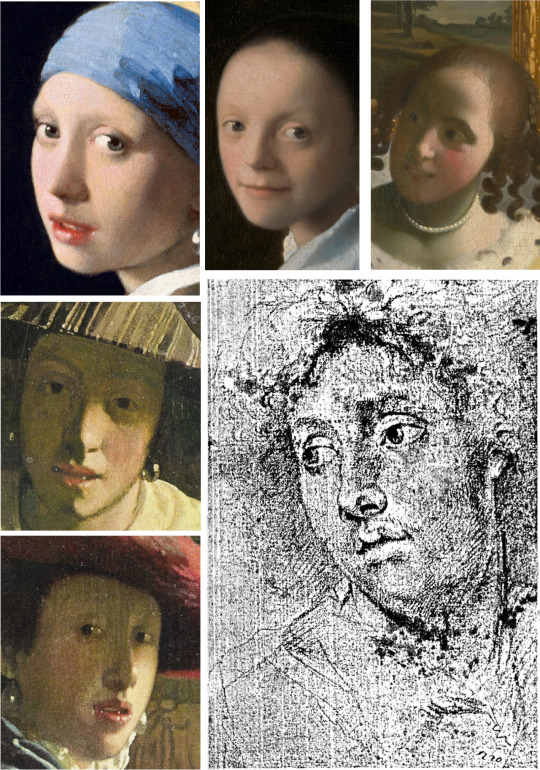
Details clockwise from top left: Girl with a Pearl Earring, Study of a Young Woman, Girl with a Guitar, Portrait of a Young Man, Girl with a Red Hat, Girl with a Flute
A second feature is the lips being parted, as in several of the works just cited. A third is the generous oval or elliptical shape of the face as a whole, which is the result of underplaying the chin and cheekbones.
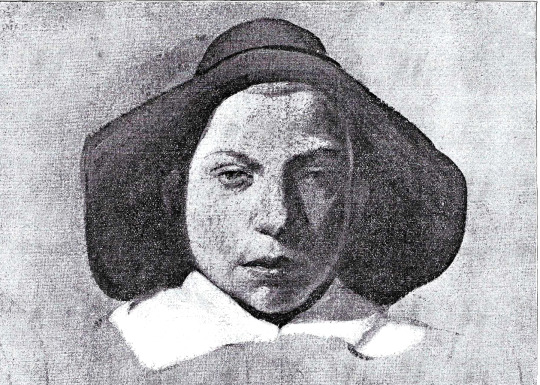
Studienkopf - Study of a Boy’s Head, attributed to Vermeer
‘Oil paint on paper’ and the above remarks about oval faces are a cue to insert here a small study of a face in that medium that is in the Berlin Printroom. This has long been attributed to Vermeer, not by all but by many scholars from 1907 onwards. It bears all the signs of being by his hand and, besides being a fine and precious thing in itself, is a helpful link to other things. Notice, again, the shape of face that is different from what we find in other artists’ work, the mouth with its wavy upper and sensuous lower lip, a certain relationship and distance between eyebrow and eye, and of course the light that shapes everything. Whether this is an abandoned self-portrait no one can say for sure, but it could be. If one looks hard at oneself in a mirror, the eyes do narrow and squint a little, producing the fixed ‘tunnel’ gaze that this face returns to us so straightly and directly while giving, it must be said, nothing away (but what else would one expect of Vermeer?).
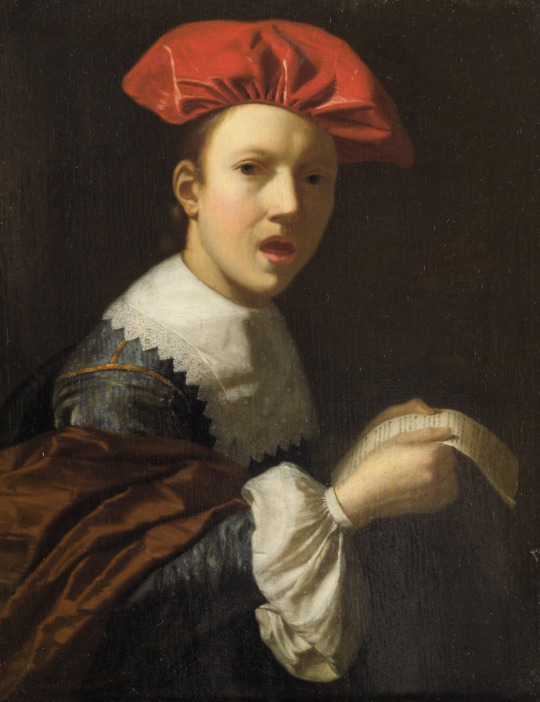
Singender Jüngling - no attribution
From Berlin to Vienna now, and from oil on paper to oil on oak: a small panel in the Kunsthistorisches Museum. This is of a young man singing (Singender Jüngling). The piece of paper he is holding does seem to be a sheet of music and as he is turned towards us with his mouth open he is probably singing, not talking to us about a letter. In any case what matters is that a living moment is caught in a turn of attention with a turn of the head, and thereby temporally and pictorially stopped for ever, as happens over and over in Vermeer. Is this picture by Vermeer? I offer it for consideration. If it is, it is not classic mature Vermeer, nor on the other hand is it very early. I would place it close to the Boston Concert (now sadly missing), the Frick ‘Girl Interrupted At Her Music’, the Metropolitan’s Servant Asleep. It is smaller than any of them, only 91/4 x 71/4 inches, the size, roughly, of the Louvre Lace Maker or the two Washington Girls.
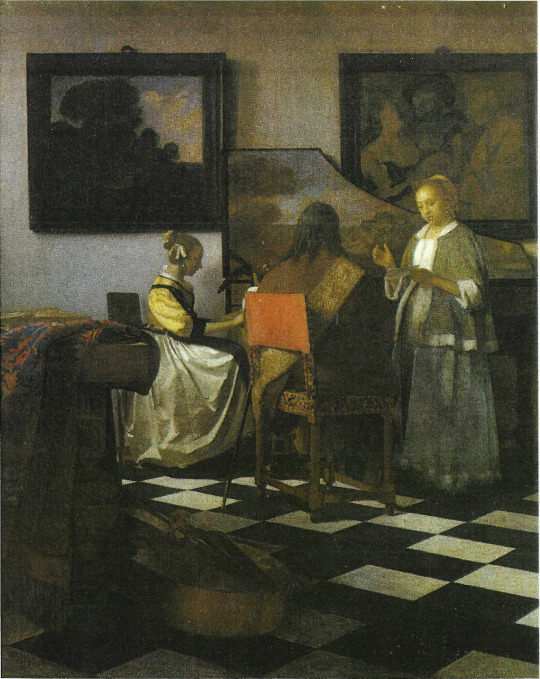
The Concert (stolen)

Girl Interrupted at her Music (Frick)

Servant Asleep at a Table (Metropolitan Museum)
At this point the Berlin oil study on paper provides a helpful comparison: for the shape of the face and of the eyes, the form of the lips (albeit closed in Berlin) and for the lighting if one imagines the face at Vienna upright, not tilted, and facing us straight on.
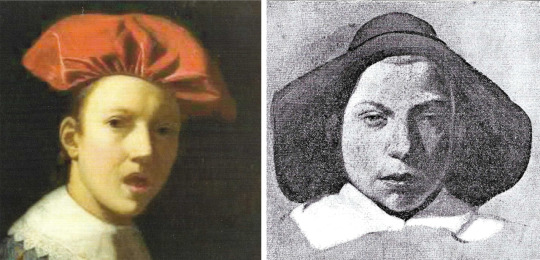
Detail of Singender Jüngling (left) and Studienkopf (right)
As for the palette the wine-dark brown mantle over the Singing Boy’s right arm reminds us of the colours in the dress of the Sleeping Servant and of the companion of Diana who sponges her foot.

Details of Servant Asleep (top) Singender Jüngling (btm left) and Diana’s servant (btm right)
From surviving images of the Boston Concert, we can not be certain but it seems likely that boy's orange ‘beret’ may be comparable with the chairback of that missing artwork.

Orange beret from Singender Jüngling (left) Chair-back from The Concert (right)
Lighting here is from a source to our left, but Vermeer – if it is he - is not yet committed fully to daylight; the boy is lit within an ambient darkness, much as in a Caravaggio or any number of portraits. The other thing to notice is the way the boy is holding the paper with both hands. One might think that numerous Dutch pictures would show hands in a similar position, but it does not appear that this is so; it is, however, a gesture that recurs in Vermeer, in the Lady in Blue at Amsterdam, the Girl Interrupted at he Music in the Frick, in the Dresden Girl Reading a Letter at an Open Window and, we shall see, in another putative Vermeer.


Details from Singender Jüngling (top), Woman in Blue (left), Girl Reading a Letter at an Open Window (centre) and Girl Interrupted at her Music (right)
With the Vienna Singing Youth we are, as noted, not out of dark and into sunlight; we are by no visible window and the light has no sparkle. We are in an enclosed world like that of the tavern or the brothel, the venue of the Procuress at Dresden where what light there is, golden and silent amid the muted voices, seems to move surreptitiously, illuminating part of a collar, a bit of wall, a patch of rug before landing in a blaze on a yellow jacket, a scarlet jerkin, a binary echoed in the carpet.
Here is another large early work, disconcertingly different from what precedes and what follows it. The oil medium is drier here and carefully applied with no broad-brush bravura, no squiggles of highlight. Where in the future it is light that will seem liquid, poured into a room as into a tank, here it is shadow that spreads downward, drowning much of the left side of the picture, all but hiding faces, turning the folds of the carpet into dark ravines, and generally claiming the territory. Here is an artist revealing himself, for now, to be potentially as great a poet of shadow as he will be of light; one is readily reminded of Caravaggio’s Calling of Matthew in Rome.
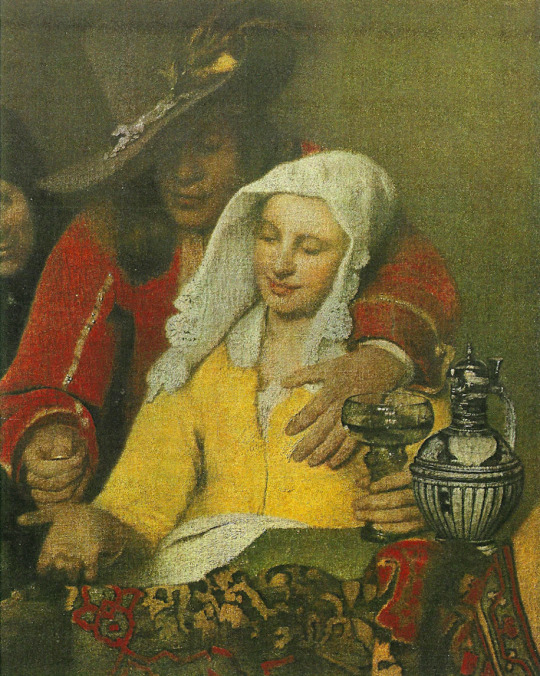
Detail from The Procuress
If we are to find anything to accompany the Procuress in this possibly short-lived stage in Vermeer's development, it must exhibit that dry handling of paint that we see in the depiction of the woman and her client. Again what I offer is a suggestion appended to a sad admission in this case that I have no idea where the picture is. It is a portrait known to me only as an old photo placed among other portraits that have been attributed at some time or another to Velasquez. It is at any rate not by him. It once belonged to a Mr A. W. Leatham.
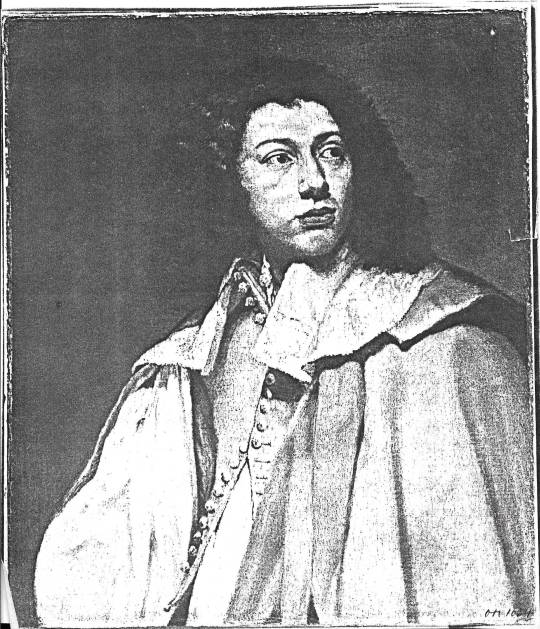
Portrait - attribution and whereabouts unknown
Here we clearly see, even in a photo, the dryness; but what lends credence to a Vermeer attribution is the face when one compares it with that of the Berlin oil study: within the same generous oval are the same eyebrows, nose and lips; the eyes in the Leatham picture are much more open but otherwise compatible. If this were to be Vermeer's it would be our only independent painted portrait - of whom we may never know.

Maidservant Warming Her Feet - attributed to Vermeer
In the volume referred to at the top of this essay, the 1958 Phaidon Vermeer by Ludwig Goldscheider, there is one drawing included among the main body of plates, a drawing therefore that Goldscheider clearly thought was definitely by Vermeer. It had been published once before, by H Leporini in 1925, but Goldscheider helpfully reproduces it in its actual size. He calls it Maidservant warming her Feet; the original is in the museum at Weimar. The monochrome reproduction gives one a good idea of the soft graininess of the black chalk finely hatched in strokes that run at right angles to the pose of the seated servant. What cannot be seen are the touches of red chalk added to neck and forearm (much as in the Windsor drawing) or the white heightening that in a photo looks deceptively like the white of the paper though the paper in reality is blue.
Why is this beautiful drawing omitted from subsequent books on Vermeer? Could it be that scholars are sceptical on account of the artist’s monogram V M drawn on the side on the footwarmer? One can agree that this is unusual, but that by itself should not be ground for exclusion; genius can be allowed some eccentricity, and anyway it is not too difficult to imagine that this very finished and presentable drawing was in fact presented to someone, possibly the model for it, and that the monogram was added as a mark of the special occasion or as a token of gratitude or to pay a debt. Nobody suggests that it is an outright fake from a later century, so it has to be of Vermeer's time and I question whether any contemporary could produce a drawing of this quality and of this kind - a drawing where form is defined so consistently by light. This is Vermeer's photographic vision, as it would be Seurat’s in a later age.
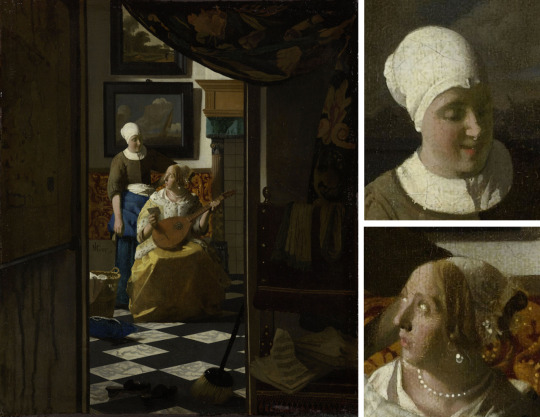
The Love Letter - Vermeer’s use of light is comparable to Maidservant Warming Her Feet
The sitter, besides: is surely the family's stalwart servant, Tanneke, the same who pours milk and delivers a letter (in two paintings) and maybe holds a jug as she opens a window.
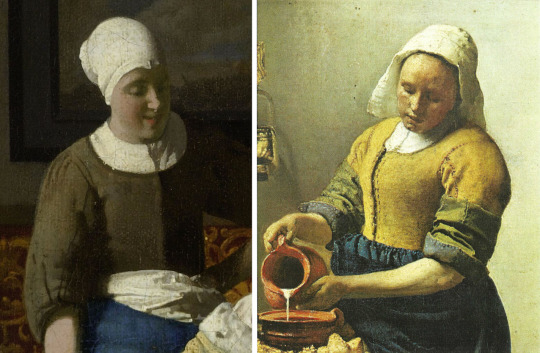
Details from The Love Letter and Milkmaid for which Vermeer used his maid Tanneke as a model
The date of the drawing is anyone's guess, but it clearly belongs in the period of the great cameral pictures. Another drawing, of unknown whereabouts and less remarkable is of similar facture and shows a servant asleep.

Drawing of a Servant Asleep - unknown
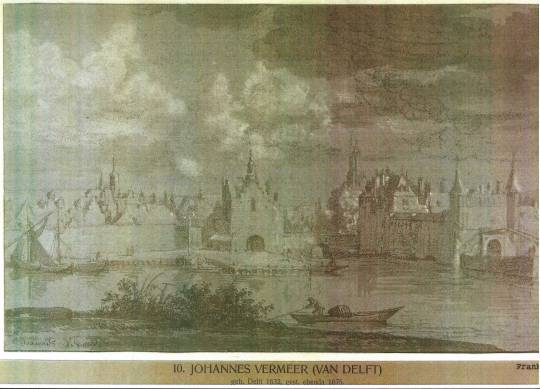
View of Delft by Moonlight - attributed to Vermeer
Scepticism regarding the Weimar drawing seems to have led to doubting generally that any extant drawing is by Vermeer. This is a pity because there is much to be learned from his draughtsmanship. Take this drawing at Frankfurt, a supposed copy of the famous View of Delft from across the canal to the south of the town.

The Original ‘View of Delft’ by Vermeer
Why would a copyist take such liberties with what he is copying from? Why alter the arrangements of the buildings, omit barges, totally change the sky and foreground, remove figures and substitute fishermen in boats? He would be a remarkably inventive copyist who did all that! How much more likely that this is a drawing Vermeer made in situ on a day when there was a busy sky with rain-threatening cloud but with sun behind him that lit the south-facing walls, towers and spires of the town. The painting in the Mauritshuis, like a large ‘Academy’ Constable, is the outcome of onsite visits and studies all of which contributed to his decision-making, but none of which was exclusively determining.
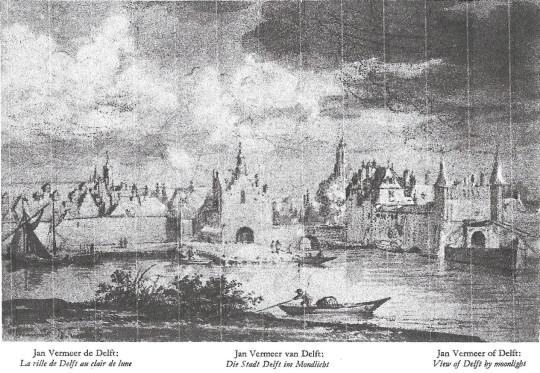
It is very believable that a painter with Vermeer's temperament, seeking always a calm resolution, would not in the end choose a hectic cloudscape, would want to clear the foreground of weeds and bushes, would reject as picturesque a man in a boat who distracts attention from the town across the water, and would decide that the town could not cohere if too many surfaces were lit at the same time across the whole piece. Instead, as we can see in his final consummation, he creates a series of long horizontals from the left, lowers the red- tiled roofline, extends the town wall and the quay, and emphasises all of this with a long placid reflection in the water.
The gap in the reflections comes where the two southern gates of the town connect at the bridge, and that is where he chooses to have the sunlight begin to illumine, not the immediate edge of the town but the buildings beyond and within it; this illumination then continues, ducking and weaving, to the limit of the picture on our right. It can therefore be said to be an outdoor view with an interior, of the town, lit from the right, as only the Lacemaker is among his indoor pictures.
Something curious about the painting vis-a-vis the drawing is the effect created by clearing the foreground of everything except very small figures that lead our eye from a point directly under the reflected left tower of the Rotterdam Gate, across the deserted sandy back to the two women talking, and thence to the group waiting for the ferry at the far left. Vermeer has radically revised in a way that manages to make the town as a whole seem nearer than the foreground figures but as calm and reflective as any of his single figures in a room. At the same time he has concentrated the light in the right half of the picture and given it a warmth to match the pale ochreous emptiness of the foreground that starts from the left, dies towards the right.
Old reproductions of this extraordinary painting show that the cloudscape was perhaps once much more modelled and interesting than it now is. As too often happens, there has been a flattening, a loss of density and volume in clouds that Vermeer knew to have both.
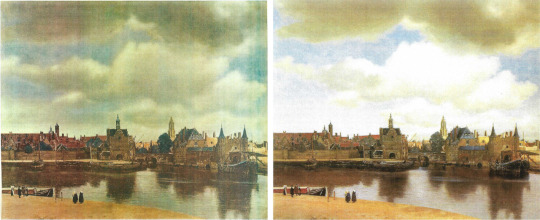
Vermeer’s painting before (left) and after (right) cleaning
If the drawing is original, then it tells us that Vermeer was no different from Ruysdael, Jan van der Cappelle or any of his country's great skyscapists in his understanding that clouds have a superstructure and an undercarriage and as such constitute a sort of moving architecture as they build, dissolve, and build again - a match for earthly buildings shaped by light.

Painting of Maid and Child - attribution and location unknown
The same lesson may be learned from the last item I can offer which, like the Leatham portrait, I know only from a photograph. I do not know its whereabouts or even whether it exists. Coming across the photo lying among unattributed Dutch paintings was nevertheless a memorable moment because I connected the image at once with Vermeer, specifically with his family’s servant, Tanneke, she of The Milkmaid, sitting in her place in the kitchen with a letter held between her hands - in that now familiar position - as she turns aside to attend to a child with a bowl. It seemed clear that the original, of which this may be the only record, was unfinished, abandoned by the artist for whatever reason.
If the original was indeed by Vermeer, then it would be unique among his known works in being a composition with a child in it. Why are there no children in Vermeer's paintings? Did he exclude them because they were too excitable, would never stay still? Did he exclude the elderly because they reminded him of the nearness of death, the fate of too many children of his time, including some of his own? In this case a child does get included, but how securely? Did the artist have doubts? If he took the child out, it would leave the servant looking down to our right for no obvious reason. Her pose is towards our left but her attention is to our right. If the child stays, the chiasm demands something - a small window - in the upper left corner.
Such is the rationale of the image as a composition, but the photo also suggested something about the original’s texture and lighting, factors which go together. What I particularly noticed and was excited by were incipient signs of those lovely beads of light so uniquely characteristic of Vermeer's art.
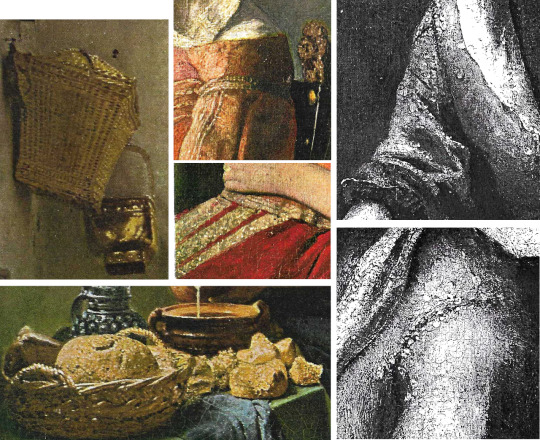
Details of painting techniques in The Milkmaid (left) and The Glass of Wine (centre) which could be compared with the portrait of Maid and Child
I had supposed that they were last touches, yet the photo appears to make them part of the earlier planning of a picture, prefigured elements in his vision of a scene. If the original ever turned up, we could be satisfied about these technical mysteries.
For myself, I am not sure that I want or need to know how Vermeer painted his pictures; I am reasonably content to marvel at the mysteries and credit them to genius. However, in view of the damage, as I see it, done by conservators to some of the Vermeers that we have in our museums the above old photo from 1947, of a lost picture that passed through the hands of a dealer called Katz, is valuable evidence that from the start of a painting Vermeer knew that what he wanted to record was light, and that light falls in a logical way which creates, according to the time of day, profound areas of shadow that can abut the light with little or no gradation.

Above are two photos using natural light and shadow (left and right) Detail from Lady Writing a Letter with her Maid (centre)
This is most true on a sunny day in the morning, less true by early afternoon. The contrast, clearly visible in the photo, between the lit and shadowed side of a sleeve is extreme. We all know this because we all live in the age of photography, the age that began just before Vermeer started to be rediscovered. Unfortunately for his paintings - and certainly not only his - we also inherit the preoccupations of the twentieth century which to a large extent revolved around the picture plane and its flatness. Combine flatness with iconography, another leading concern, and you get a visual sensibility that finds the pattern on a carpet more important to clarify than the logic of the light which would keep it dark. Here are two photos to illustrate (in the original sense of the word) the contrast that must be respected.
I am not a conservator. Even the thought of surgical intervention in the surface of a Vermeer makes me nervous; but if intervention is ever necessary I think two rules must apply: always respect the logic of the light, and never, if you can help it, reveal the canvas or other support. Vermeer's art is one of illusion, a very poetic and light-sensitive version of trompe l'oeil. Expose the canvas and you destroy the illusion; a wall ceases to ‘be’ a wall and becomes what it mostly is in de Hooch, a bit of brushwork pushed around over a bit of stretched cloth.
In conclusion I hope it is clear that drawings and even old photos can tell us important things about the essential nature of an artist's vision, the imagination that shapes images, in Vermeer's case through light and light’s dark accomplice. Having opened this essay testifying to my own long admiration for the art of Vermeer, I can best end it on a similar note but in the context of Delft. A painter called Cornelis de Man lived there at the same time as Vermeer and painted some pictures of domestic interiors that are testimony to his own admiration for those of Vermeer, a fellow-townsman and Guild member whom he personally knew.
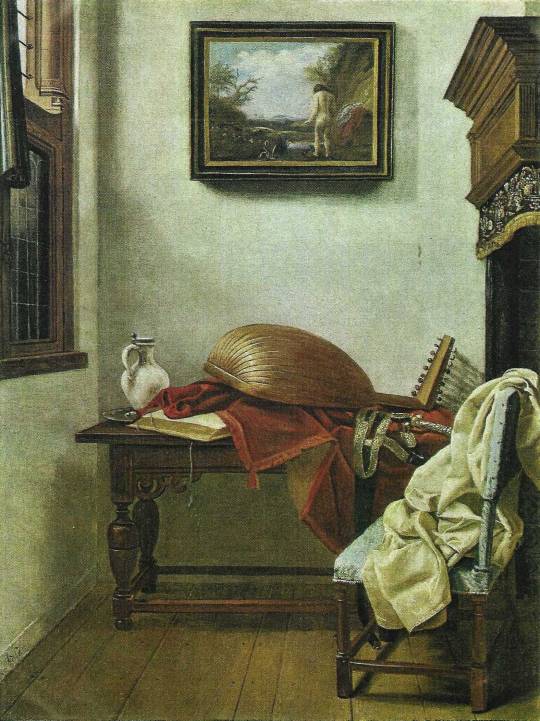
Still Life with Lute and a Jug - De Man
The picture of Vermeer that is now at Miami (and which was later engraved) is by this artist and very much in the Vermeer manner though crude and inferior by comparison.
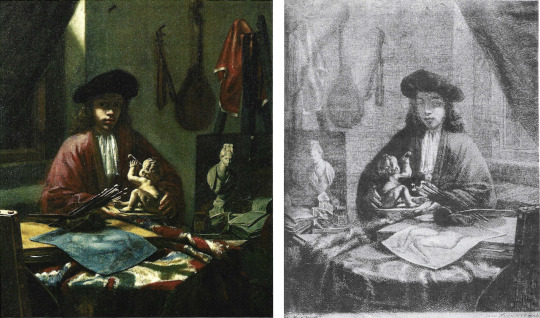
Portrait of Vermeer by De Man (left) and engraving thereof (right)
Also by this artist is a far better and more finished picture at Polesden Lacy near Dorking.
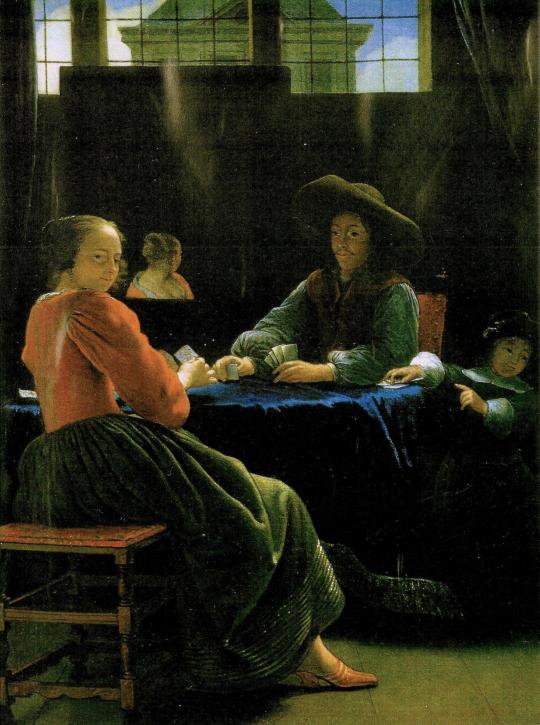
The Game of Cards - De Man
It shows a middle-aged man facing a young woman over a table where they are playing cards. A young child to the right who stands hardly higher than the table on which one hand rests looks out of the picture to direct, perhaps, another child's attention to the grown-up’s game. The young woman looks round towards us as one might turn to a camera.
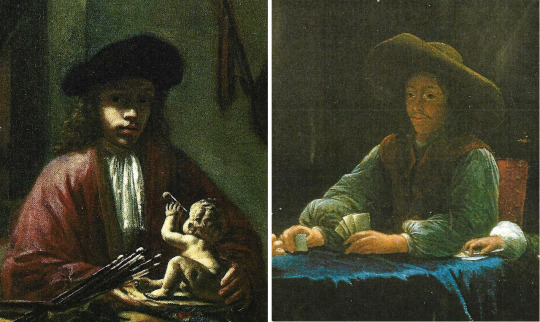
Details from De Man’s Portrait of Vermeer and The Game of Cards
Comparing the face of the man with that of the painter in the Miami picture, I think it very probable that we are looking at Vermeer himself relaxing opposite one of his daughters, with another of his many children beside him. The picture can stand in any case as a pleasant memorial to that genius of a ‘family man’, celebrant of town, home, kin and friends, who was happy to include those closest to him in what are still, despite the cleanings, some of the greatest of all representational paintings.
Julian Pritchard
March 2017
#vermeer#art history#dutch painter#flemish school#art theory#painting techniques#stolen art#frick museum#metropolitan museum of art#kenwood house#cornelis de man#girl with a pearl earring#connoisseurship
4 notes
·
View notes
Text
Vulgar Tarot, Today: Sandringham Edition
All speculation for entertainment only and no harm is intended just as no future is known.
I've been pulling cards but I haven't been documenting it. And, I realize that's rather stupid of me. With the Sandringham Summit approaching fast and hard, I did a brief reading on the Sussex’s.
'Will Harry and Meghan get what they want?'
Ace of Wands Rx, 7 of Pentacles, 7 of Swords, 8 of Swords Rx, The Tower Rx, 2 of Wands, 3 of Pentacles Rx, Strength, 5 of Cups, The Sun
Well, Harry seems every bit as petulant as whispers imply. He definitely feels trapped and is miserable with his life, and he doesn't like the power imbalance he thinks he'll face at Sandringham. Looks like he's going to get what he wants, eventually, but it's not quite clear what it is that he wants… beyond everything.
So, what does Harry want? Really want?
The Knight of Wands jumped. He wants all the new, exciting things he believes are waiting for him in the greener pastures that he's yet to find. He's ready to fail learn, to live. If things are good with the wife, Meghan could end up pregnant. Harry is raring for all the pleasures awaiting him.
Ha! The Emperor: someone wants to be King of Something, the official Ruler of his own life! Don't we all, Harry, don't we all? (An aside, I still think of Prince Philip when I see this card and I guffawed at the thought of Harry trying to be like Phil. Old Phil may be many awful things, but he wasn't a whiner at least where anyone could know about it. Although, he did allegedly pout for a decade after the House of Mountbatten didn't replace the House of Windsor, so maybe Harry knows his goals after all?)
Ace of Pentacles is his obstacle… well, that wasn't news. Money. What about the guaranteed money from Pa? How will he have enough to make sure the North Americans curtsy/bow to him?
8 of Wands lies beneath: He has truly been caught up in the desire of his/her/their fantasies for the future. Gotta go, go, go to get, get, get! Bless him, he wants to hustle like the Missus. Need for 'more' and 'doing' has been shaping him. No wonder his behavior has seemed so zealous. This card is giving off an almost manic energy.
The Sun: Well, that's a sad card to have in the past. I don't think its lost romantic love. It feels like this means he's no longer in love with being a royal, that he almost sees his past years of contented adulthood as childish folly, marching to another's drum without noticing he didn't have a beat of his own.
What's the potential here? 2 of WANDS! The fourth time within the week that I’ve pulled this card regarding this situation. I can't escape this card, but this is my first Harry only reading. And, he's got the Emperor, as well. 2 of Wands is officially important. Lots of hoping, waiting and relocating for Harry, keep dreaming of power! Good luck to him, honestly, he yearns for something other and/or more than what he has. (Can I just say that as an American, I hope he doesn't get the opportunity to role play in Granny's 'new world' as a kinder/gentler but woke George III?)
Fuck this future is shit. 10 of Cups Rx. Poops hitting the fan, so no happy families in the near future. Everyone suffers, YAY!
LMAO! Harry's self: King of Swords. Maybe he really does want to be Prince Philip? Either he sees himself as a man in control who knows exactly what he wants, or he desperately wishes that he was that person. Consistent with the rest, honestly. And, it does take a big set of balls to challenge the traditional roles within the monarchy. (I think most may be putting the blame for his audacity on his wife, which would appear to be a mistake. A catalyst she may be, but you can't strike a fire from water rubbing against water. The woman needed something to work with!) Harry's vices are his own.
Environment, Friends Family: The Devil Rx! Well, well, well. He truly resents the monarchy and his family or the lack of status he has within said family. He doesn't trust them to give him what he wants, which he believes he deserves. This isn't a card I wanted to see. He could do anything in a pique of temper. Or, will the BRF live up to all our expectations and be vicious to protect itself? Excitement and betrayal abound.
Worries/fears? Justice Rx: Again, makes total sense. Of course, he'd be worried about unfair treatment (at least from his perspective) of his family and new/old position. Is he in denial about some things? (I think so, but it's okay if you think I'm an idiot.) Regardless, he's bitter and expecting the worst.
The Outcome: Page of Swords Rx… wow, considering this is what Harry wants, I think the BRF better double check all their alibis and NDAs. He wants to play dirty. Shit is going to get leaked. Surprise! Will he piss on his own fire or burn down the House of Windsor? Only time will tell! Seriously, though, I get the feeling that this situation is beyond significant for everyone involved. It may come down to who has the most embarrassing information and/or willingness to use it for harm.
2 notes
·
View notes